

100+ Good Quantitative Research Topics For Home Economics Students
Are you a Home Economics student wondering about Quantitative Research Topics? Well, here’s a simple guide just for you! Quantitative Research Topics for Home Economics Students involve studying measurable data related to household management, economics, and various aspects of home life. But what does that really mean?
Generally, Quantitative research is all about measurements and numbers. For Home Economics students, it means exploring topics like consumer behavior, budgeting, nutrition, or even the impact of technology on household duties—using numbers to understand trends, behaviors, or outcomes.
For instance, let’s say you’re curious about the relationship between family income and healthy eating habits. A quantitative study might involve surveying families about their income levels and comparing that data with their food choices. This helps in understanding how income influences the food preferences and nutritional habits of households.
Other fascinating topics could be analyzing the effectiveness of various cooking methods on food nutrition, investigating the correlation between household expenses and savings, or even examining the influence of social media on consumer buying patterns for household items.
So, Quantitative Research Topics for Home Economics Students are basically opportunities to explore and understand different aspects of home life using numbers and data. It’s like solving puzzles with information!
You May Also Like: Qualitative Research Topics for High School Students
Table of Contents
What Is Quantitative Research In Home Economics?
Quantitative research in Home Economics involves using numerical data and statistical analysis to investigate and understand various aspects of household management, economics, and related areas. It focuses on collecting measurable information and using mathematical or statistical methods to draw conclusions about specific phenomena within the realm of home and family life.
In this field, quantitative research often involves gathering data through surveys, experiments, or observations that can be quantified, such as household budgets, nutritional intake, consumer spending patterns, time management in household tasks, or technological advancements affecting domestic activities. Researchers then use statistical tools to analyze this data, identifying patterns, correlations, and trends.
For example, a quantitative study in Home Economics might analyze the relationship between family income levels and the types of food purchased, examining how economic factors influence dietary choices. Researchers might collect data on income brackets and survey families about their grocery shopping habits to draw conclusions about spending patterns related to nutrition.
How To Choose Quantitative Research Topics For Home Economics Students
Here are five easy steps to help Home Economics students choose quantitative research topics:
1. Identify Your Interests
Start by exploring your personal interests in Home Economics. Consider topics that intrigue you, such as budgeting, nutrition, consumer behavior, time management, or technology’s impact on household tasks. Choose areas that you find fascinating and want to learn more about.
2. Conduct Preliminary Research
Look for existing studies, articles, or resources related to Home Economics. This exploration can help you discover popular topics, gaps in research, or emerging trends. Check reliable websites, academic journals, or books to get ideas and understand what topics have sufficient data for quantitative analysis.
3. Narrow Down Your Focus
Once you have a list of potential topics, narrow them down based on relevance, feasibility, and available data. Consider the scope of your research – it should be specific enough for in-depth analysis but broad enough to find ample information for quantitative investigation.
4. Consider Data Availability
Ensure that your chosen topic has accessible data or means to collect measurable information. Think about the methods you might use—surveys, experiments, or data sets—to gather quantitative data. The availability of data will significantly impact the feasibility and success of your research.
5. Assess Significance and Impact
Evaluate the importance and relevance of your chosen topic within the field of Home Economics. Consider the potential impact of your research—how it can contribute to understanding household management, inform practical solutions, or address relevant issues within domestic life.
Why Do Students Need Home Economics Research
Students need Home Economics research because it:
- Equips with Practical Life Skills: Teaches essential skills like budgeting, cooking, and time management for everyday life.
- Understands Household Dynamics: Explores family relationships, socio-economic influences, and decision-making within homes.
- Improves Quality of Life: Enhances living standards by promoting healthy habits and efficient home management.
- Develops Financial Literacy: Educates about budgeting, savings, and making informed financial decisions.
- Promotes Health and Well-being: Focuses on nutrition, healthy lifestyles, and hygiene practices for better health.
- Enhances Consumer Awareness: Educates about responsible consumption, consumer rights, and environmental impact.
- Prepares for Careers: Provides a foundation for various professions like nutritionists, chefs, counselors, or analysts in related fields.
List of 100+ Good Quantitative Research Topics For Home Economics Students
Here’s a list of quantitative research topics for Home Economics students across different fields:
Nutrition and Food Science

- The correlation between household income and dietary habits.
- Analyzing the nutritional content of different cooking oils.
- The impact of food labeling on consumer choices.
- Assessing the effectiveness of nutritional education programs in schools.
- Examining the relationship between food allergies and household meal planning.
Budgeting and Financial Management

- Analyzing the impact of advertising on household spending habits.
- The effectiveness of budgeting apps in managing household finances.
- Investigating the correlation between financial literacy and savings rates.
- Assessing the impact of inflation on household purchasing power.
- Analyzing the factors influencing consumer debt in different socio-economic groups.
Consumer Behavior and Decision-Making
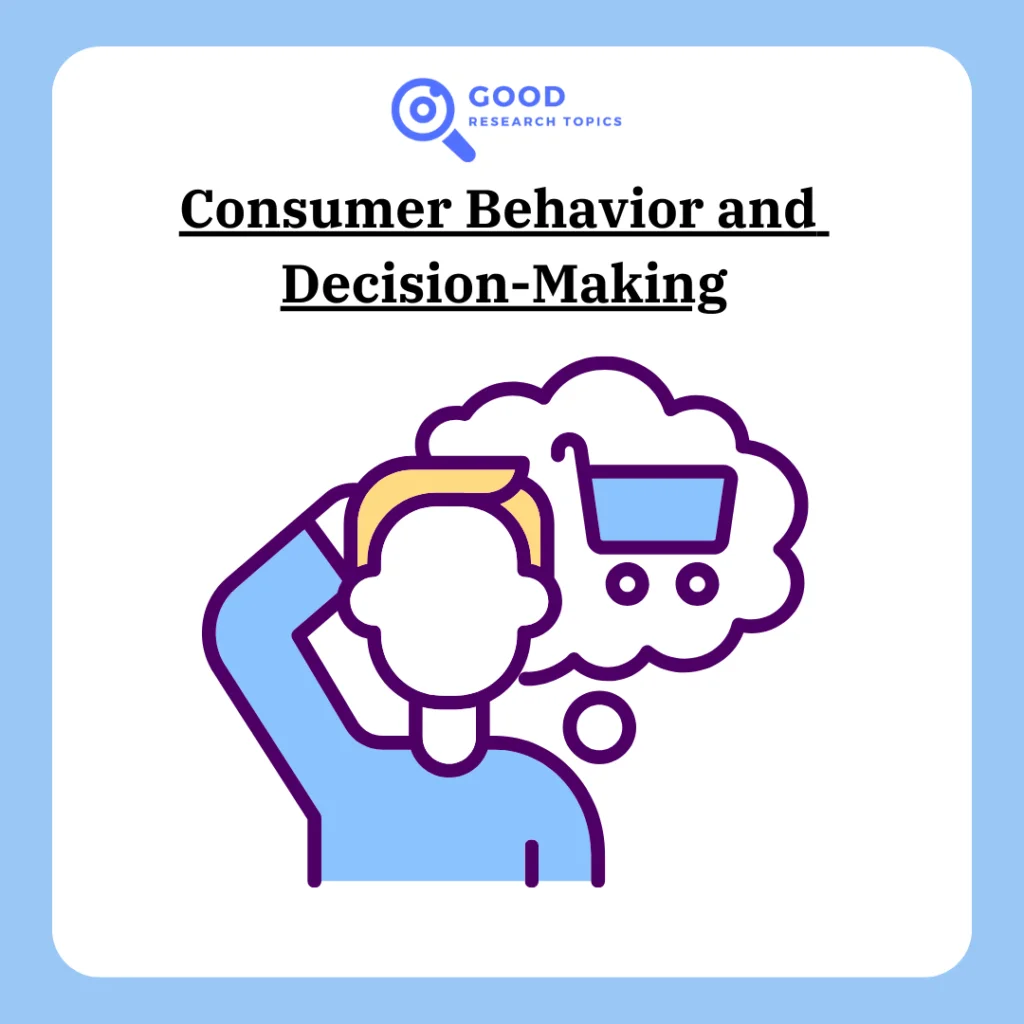
- The influence of social media on purchasing decisions for household items.
- Analyzing trends in online versus in-store shopping for home products.
- Examining the impact of brand loyalty on consumer choices within households.
- Investigating the factors influencing sustainable and eco-friendly product purchases.
- The psychology behind impulse buying behavior in household shopping.
Family Dynamics and Relationships

- Analyzing the division of household chores based on gender roles.
- The impact of parenting styles on children’s dietary habits.
- Investigating the correlation between family communication and financial management.
- Examining the effects of family structure on budgeting and expenditure.
- Analyzing the impact of technology use on family interactions and bonding.
Time Management and Home Organization
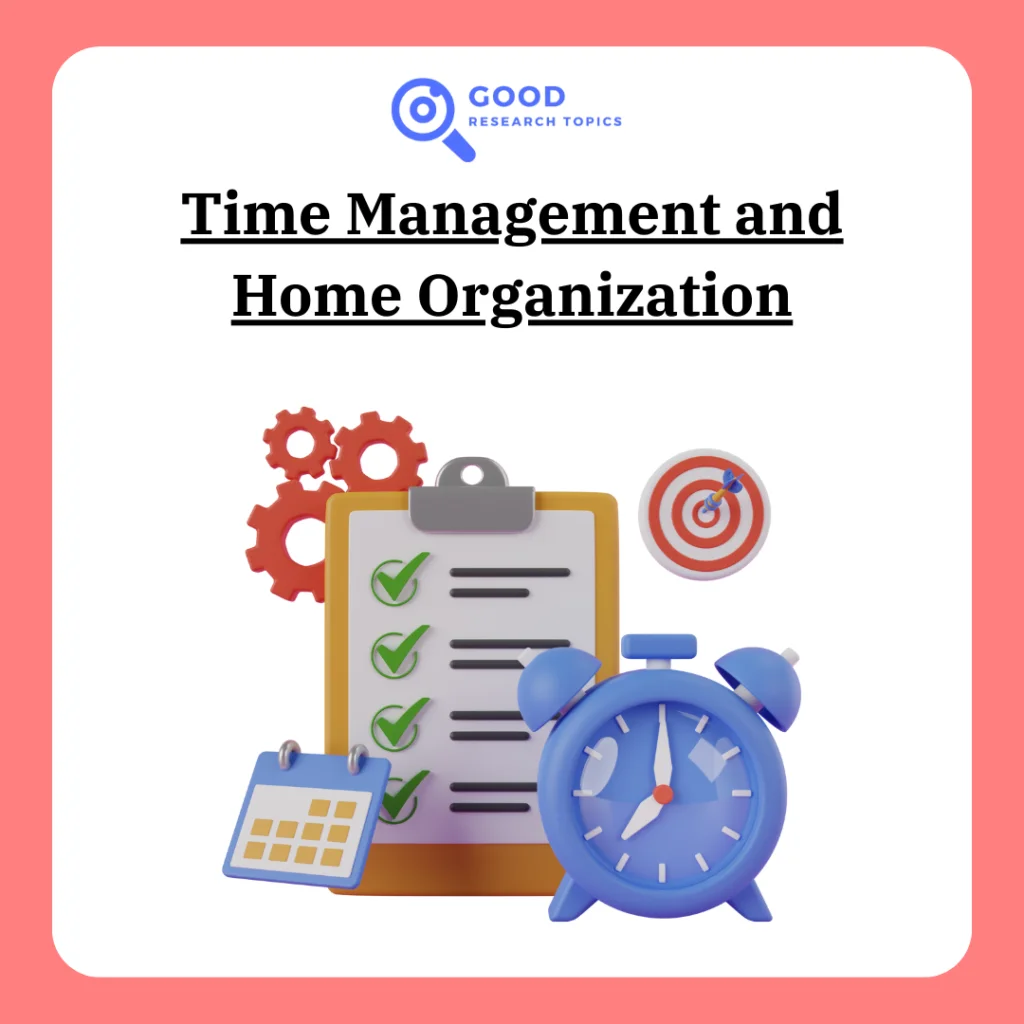
- Assessing the effectiveness of time management techniques in household tasks.
- Analyzing the impact of decluttering on mental well-being within households.
- Investigating time allocation for meal preparation in dual-income households.
- The correlation between home organization and stress levels.
- Analyzing the use of technology in optimizing household routines and organization.
Home Economics Education and Curriculum

- Assessing the effectiveness of Home Economics education in high schools.
- Investigating the impact of practical cooking classes on students’ dietary choices.
- Analyzing the inclusion of financial literacy in Home Economics curricula.
- Examining the role of Home Economics in promoting sustainable living practices.
- Investigating student attitudes towards Home Economics as a subject.
Technology and Home Management
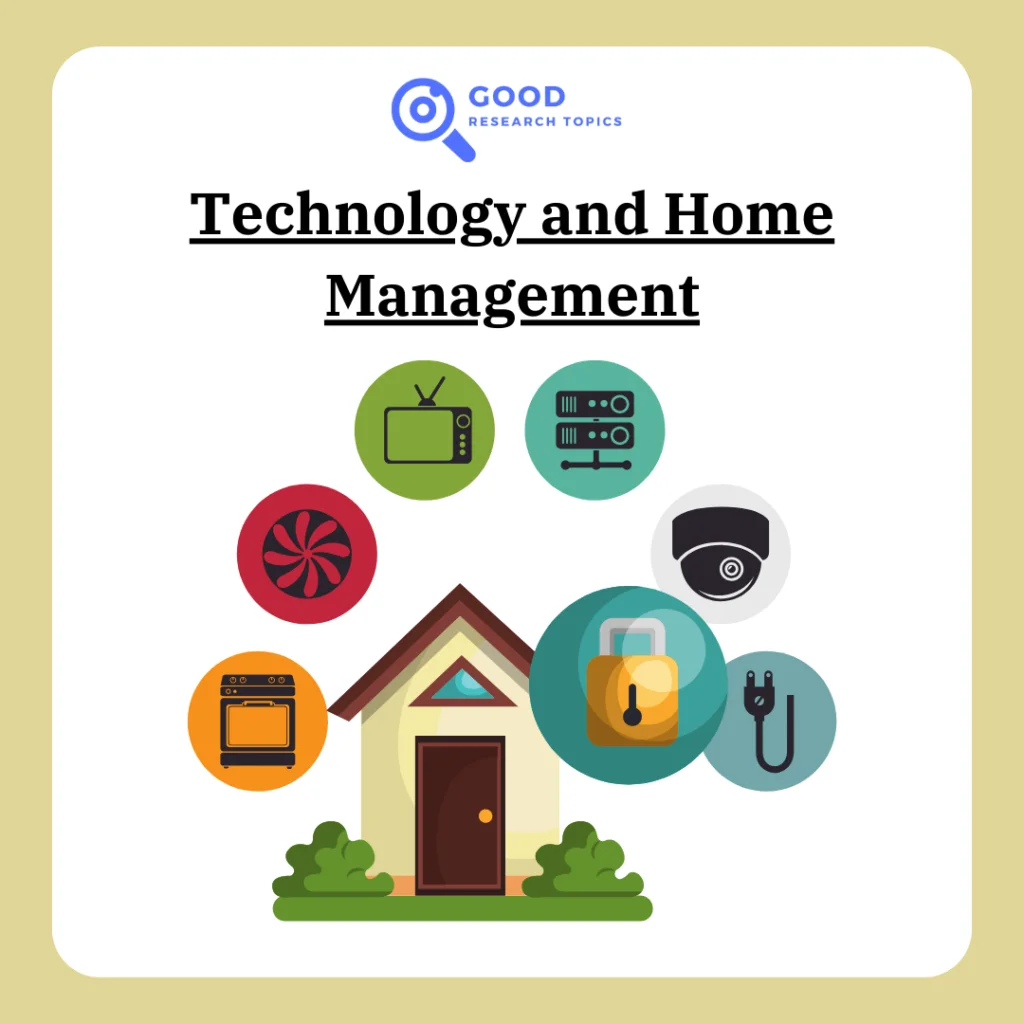
- Analyzing the impact of smart home devices on energy consumption.
- Investigating the use of meal-planning apps in managing household nutrition.
- The correlation between technology adoption and efficient home management.
- Assessing the impact of technology on time-saving in household tasks.
- Analyzing the digital divide and its effects on access to technology for home management.
Health and Wellness in Home Settings

- Investigating the relationship between mental health and household environments.
- Analyzing the correlation between home cooking and overall family health.
- Assessing the impact of home gardening on dietary choices and nutrition.
- The effectiveness of home-based exercise programs on family fitness levels.
- Analyzing the role of sleep quality in household productivity and well-being.
Sustainable Living and Environmental Impact
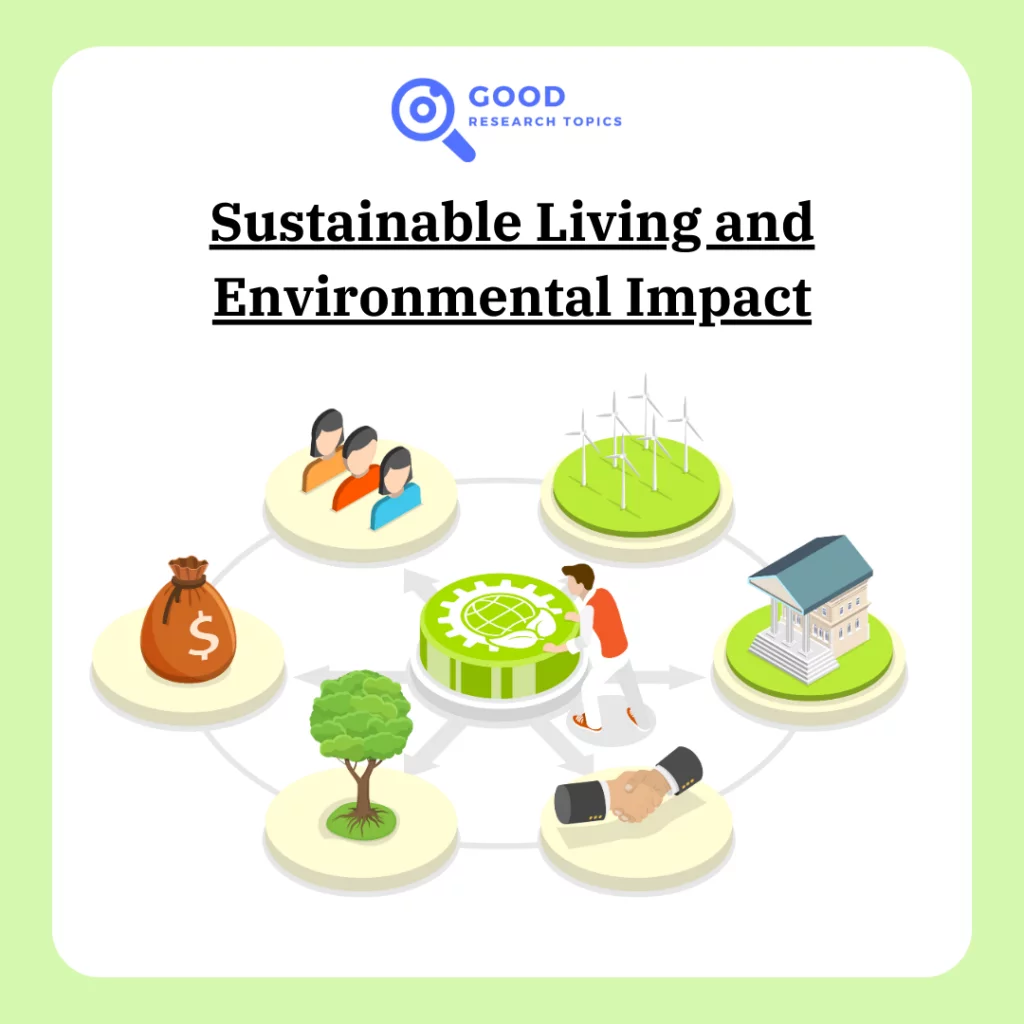
- Investigating household recycling habits and their environmental impact.
- Analyzing the adoption of sustainable practices in household cleaning routines.
- The correlation between eco-friendly product usage and household budgets.
- Assessing attitudes towards sustainable food choices within households.
- Investigating the impact of transportation choices on household carbon footprint.
Cultural Influences on Home Economics

- Analyzing cultural variations in traditional family recipes and cooking methods.
- Investigating the impact of cultural heritage on household traditions and practices.
- The correlation between cultural values and financial decision-making within households.
- Assessing the influence of cultural norms on home organization and cleanliness.
- Analyzing cultural differences in clothing and fashion expenditure within households.
Aging and Home Management
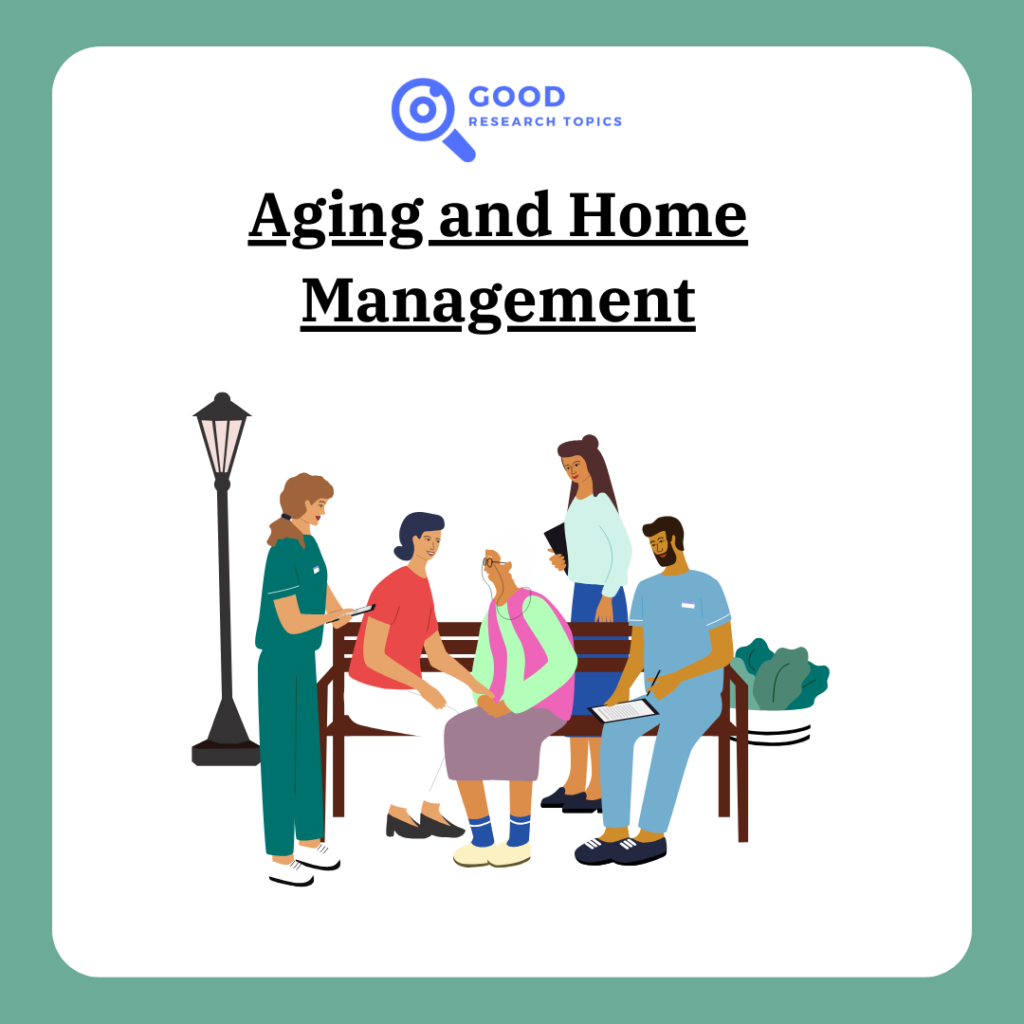
- Investigating the challenges of aging populations in managing household tasks.
- Analyzing the impact of home modifications on elderly independence.
- Assessing the use of technology for elderly-friendly home management.
- The correlation between nutrition and health in elderly household members.
- Investigating caregiving dynamics and stress levels in multigenerational households.
Gender Studies in Home Economics

- Analyzing gender-based disparities in financial decision-making within households.
- Investigating the impact of gender roles on time allocation for household tasks.
- Assessing the influence of gender stereotypes on consumer choices within families.
- The correlation between gender equality and household economic stability.
- Analyzing the role of education in challenging gender norms in home management.
Housing and Real Estate Economics

- Analyzing the correlation between homeownership and financial stability.
- Investigating the impact of housing market trends on household expenses.
- Assessing the influence of location on housing-related expenses within households.
- The effectiveness of housing subsidies in improving family well-being.
- Analyzing the impact of housing affordability on family budgeting.
Workplace and Home Life Balance

- Investigating the impact of remote work on household dynamics and time management.
- Analyzing the correlation between work hours and family spending habits.
- Assessing the effectiveness of strategies to balance work and home responsibilities.
- The influence of job flexibility on household organization and stress levels.
- Investigating the correlation between work-related stress and household relationships.
Fashion and Textiles in Home Economics

- Analyzing consumer preferences in purchasing sustainable and ethically-made clothing for the family.
- Investigating the impact of fashion trends on household clothing budgets.
- Assessing the correlation between textile waste and household consumption habits.
- The influence of cultural heritage on textile choices within households.
- Analyzing the role of fashion influencers on household clothing purchases.
Community and Social Impact of Home Economics
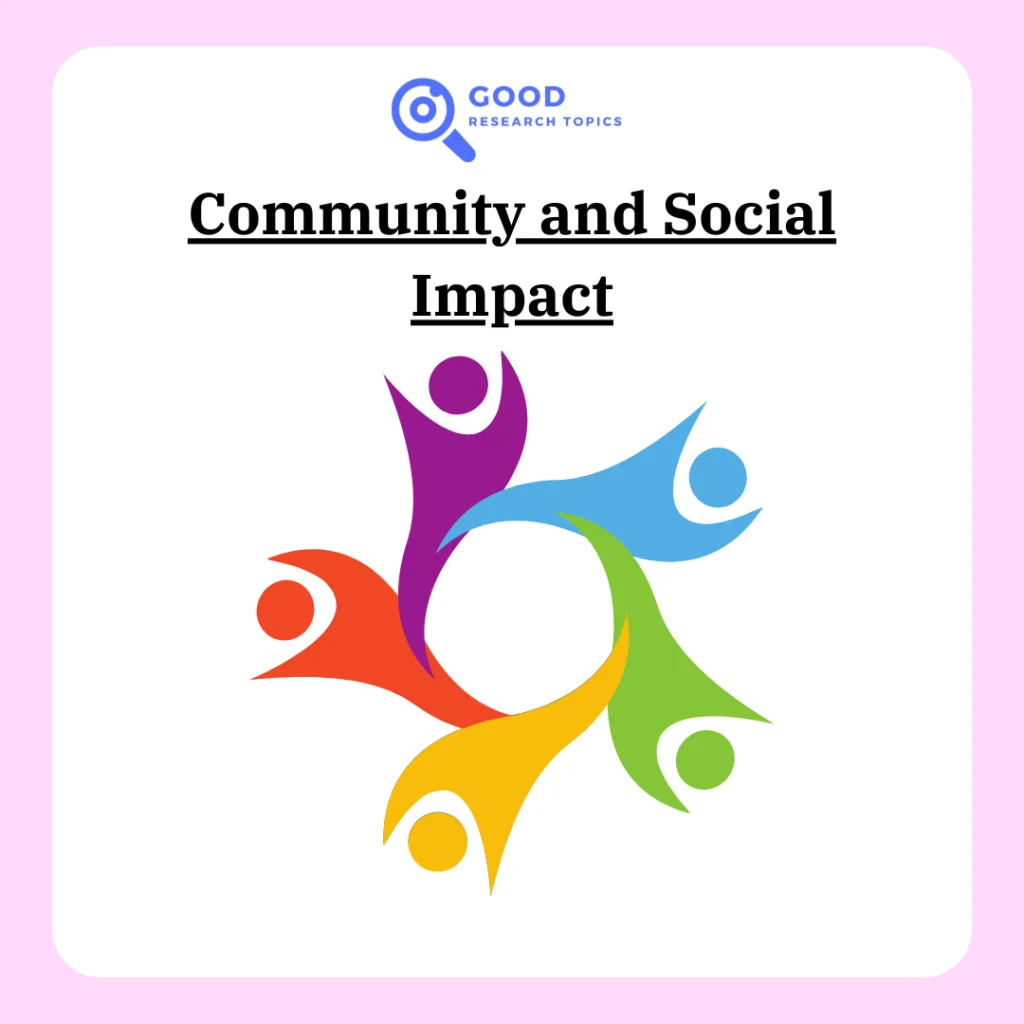
- Investigating the role of community-based initiatives in promoting household sustainability.
- Analyzing the impact of Home Economics education on community health and nutrition.
- Assessing the correlation between household practices and community environmental impact.
- The influence of community support systems on managing family finances.
- Investigating the impact of household volunteering on community well-being.
Media Influence on Home Economics

- Analyzing the impact of advertising on household product preferences.
- Investigating the role of social media influencers in promoting home management products.
- Assessing the correlation between media exposure and consumer behaviors within households.
- The influence of reality TV shows on household spending and lifestyle choices.
- Analyzing the portrayal of home economics topics in mainstream media and its effect on perceptions.
Mental Health and Household Management

- Investigating the correlation between home organization and mental well-being.
- Analyzing the impact of stress-reduction techniques on household dynamics.
- Assessing the influence of a peaceful home environment on family mental health.
- The relationship between mindfulness practices and efficient household management.
- Investigating the role of home-based therapies in supporting mental health within families.
Technology Adoption and Elderly Home Management
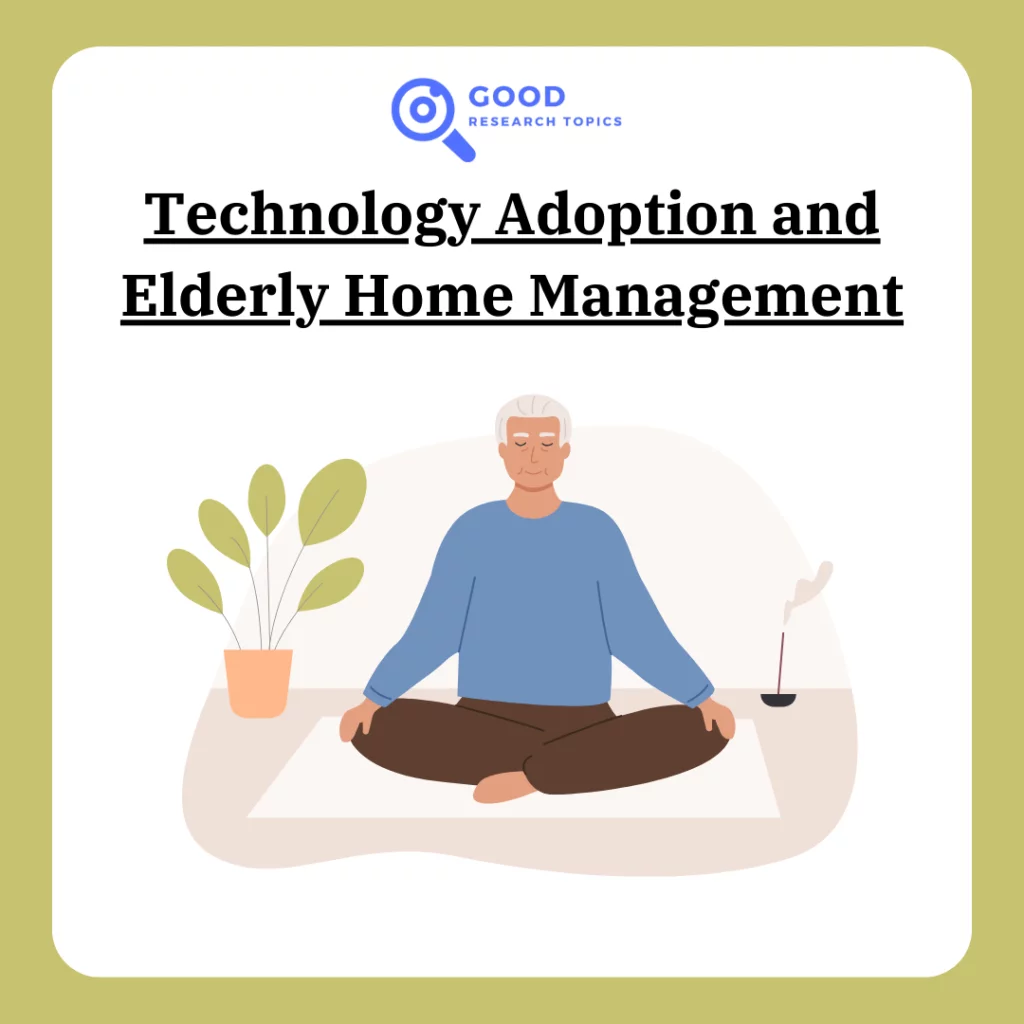
- Analyzing the use of technology for elderly-friendly home organization and safety.
- Investigating the correlation between technology adoption and cognitive health in elderly households.
- Assessing the influence of digital tools on elderly financial management within homes.
- The impact of technology on social connections and mental well-being among the elderly.
- Analyzing the effectiveness of technological innovations for aging-in-place strategies.
Social Media and Family Communication

- Investigating the impact of social media on family communication patterns.
- Analyzing the correlation between social media usage and family bonding activities.
- Assessing the influence of digital communication on conflict resolution within households.
- The relationship between online interactions and decision-making processes in families.
- Investigating the role of social media in shaping family values and traditions.
What Are The Problems Encountered By Home Economics Students?
Home Economics students may encounter various challenges during their studies, including:
1. Perception and Stereotypes
Misconceptions or societal stereotypes may undermine the importance of Home Economics, leading to a lack of recognition for the field’s relevance and significance.
2. Resource Limitations
Limited access to necessary resources like updated textbooks, kitchen equipment, or technology can hinder practical learning experiences.
3. Complexity of Topics
Some subjects within Home Economics, such as nutrition or financial management, might involve complex theories or technicalities that could be challenging for students to grasp easily.
4. Practical Application
Balancing theoretical knowledge with practical application can be difficult, especially if there’s insufficient hands-on experience or opportunities for real-life simulations.
5. Diverse Subject Matter
Home Economics covers a broad range of topics, from cooking to financial planning, which might overwhelm students who have varying interests and strengths in different areas.
6. Changing Family Dynamics
With evolving family structures and dynamics, understanding traditional and modern family roles and responsibilities may become challenging for students.
7. Technological Advancements
Keeping up with the rapid advancements in technology relevant to Home Economics (e.g., cooking gadgets, budgeting apps) might pose a challenge if students lack access or familiarity with these tools.
8. Limited Curriculum Emphasis
In some educational systems, the Home Economics curriculum might lack comprehensive coverage of crucial topics like sustainable living practices, cultural diversity, or current societal trends.
9. Career Recognition
Limited awareness or recognition of career opportunities within Home Economics fields might discourage students from pursuing related professions due to societal expectations or perceptions.
10. Integration with Core Subjects
Difficulty in integrating Home Economics with other core subjects like science, mathematics, or social studies could affect interdisciplinary learning opportunities for students.
Quantitative Research Topics For Home Economics Students Pdf
Here are the quantitative research topics for home economics students pdf.
Quantitative Research Topics For Home Economics Students In The Philippines
Here’s a table format presenting the top 10 quantitative research topics for Home Economics students in the Philippines:
Research Title About Home Economics Cookery
Here’s a table showcasing research titles specifically related to Home Economics Cookery:
Thesis Title About Home Economics In The Philippines
- “Empowering Filipino Families: Enhancing Financial Literacy Through Home Economics Education.”
- “Promoting Sustainable Household Practices: The Role of Home Economics in Urban and Rural Filipino Communities.”
- “Nourishing Filipino Homes: A Study on the Impact of Home Economics on Nutrition and Health.”
Example Of Quantitative Research About Home Economics
- “Analyzing Household Budget Allocation for Nutritious Food in Different Income Groups in the Philippines.”
- “The Effect of Home Economics Education on Budgeting and Saving Behaviors in Filipino Families.”
- “Measuring the Influence of Media on Consumer Behavior in Filipino Households: A Quantitative Study.”
Research Title About Home Economics With Author
- “Sustainable Living Through Home Economics: A Study on Filipino Household Expenditure ” by Juan Dela Cruz.
- “Technology Integration in Home Management: An Analysis of Its Impact on Filipino Homes” by Andrea Gomez.
What Is A Good Research Title For Home Economics?
Here’s a table providing a few examples of good research titles for Home Economics:
Quantitative research topics for Home Economics students offer a diverse landscape ripe for exploration and discovery. These topics provide a gateway to understanding and addressing pertinent issues within households, emphasizing numerical analysis and empirical study. Delving into areas such as nutrition, budgeting, consumer behavior, family dynamics, and technological integration, these research avenues offer a lens through which to comprehend the intricacies of domestic life.
By analyzing spending patterns, nutritional habits, or the influence of technology on household management, students can unravel the complex tapestry of factors shaping modern family life. Understanding the impact of cultural heritage on cooking practices, the dynamics of family communication, or the effects of financial literacy interventions enables a comprehensive comprehension of Home Economics.
These research topics aren’t merely academic pursuits; they hold practical significance. They pave the way for strategies to enhance household well-being, foster sustainable practices, and empower families with valuable skills. Through empirical investigations and data-driven insights, Home Economics students can contribute meaningfully to improving lifestyles, promoting health, and strengthening the economic fabric of households in the Philippines and beyond.
Frequently Asked Questions
Why is home economics not taught in schools anymore.
Home economics is less commonly taught due to curriculum shifts towards STEM subjects, budget cuts, and changing educational priorities emphasizing other skill sets.
What Are The Three Basic Economic Problems In The Study Of Economics?
The three basic economic problems in the study of economics are scarcity, choice, and opportunity cost.
What Is A Research Topic That Is Related To Home Economics Strand Quantitative?
A quantitative research topic related to the Home Economics strand could be: “Analyzing the Impact of Nutrition Education Programs on Improving Dietary Habits Among Adolescents: A Quantitative Study.”
Related Posts

100+ Most Interesting Google Scholar Research Topics For Students [Updated 2024]

THE PERFORMANCE AND ATTITUDE OF HOME ECONOMICS LEARNERS TO THEIR LABORATORY PERFORMANCES concept20191016 55956 1rsgad9

Related Papers
ATITHYA: A Journal of Hospitality
Publishing India Group
The purpose of this research is to understand the gap between the student expectation and their career aspirations from the Industry. And the differences that the industry has while recruiting these students for jobs. The research further discusses on how the faculty teaching on the Culinary Arts program needs to balance these differences and fulfill expectations from the students and the industry. The research also suggests the probable change in the curriculum to make the student aspiration and expectation much clearer and the industry to look for students who shall fulfill exact requirement with skill and aspiration to lead. The research puts focus on the need for an elective module at the intermediate and honors level so that the student can decide and specialize in the selected area of department in culinary such as Pastry. Research Methodology: The researcher has used questionnaires for getting the data related to the Pastry course taught across from three institutes which follow different curriculum. The data was gathered from the faculty and industry professionals using means of internet and also paper questionnaires. The students were given a separate questionnaire and the data was collected using internet and physical questionnaires.
Carlo Katug
carlo katug
IOER International Multidisciplinary Research Journal
IOER International Multidisciplinary Research Journal ( IIMRJ) , Frannie Rodil
The main instrument used in gathering data was the self-made and adopted survey questionnaire checklist using the Likert scale. The statistical treatments used were mean, frequency distribution, standard deviation, and Pearson Product Moment Correlation Coefficient. The data revealed that acquired skills as to analytical was significantly related to core competencies in Bread and Pastry Production in terms of preparing and producing bakery products, preparing and producing pastry, preparing and presenting gateaux, tortes and cakes, preparing and displaying petit fours. Moreover, conceptual skills were significantly related to core competencies in terms of preparing and producing bakery products. Furthermore, communication skills were significantly related to core competencies in terms of preparing and producing bakery products, preparing and presenting gateaux, tortes and cakes. Likewise, interpersonal skills were significantly related to core competencies in terms of preparing and producing pastry products and preparing and presenting gateaux, tortes and cakes which have the same rvalue. Similarly, leadership skills were significantly related to core competencies in terms of preparing and producing bakery products, preparing and producing pastry products. However, some acquired skills as to conceptual, communication interpersonal, leadership, and teamwork had no significant relationship with some competencies in Bread and Pastry Production in terms of preparing and producing bakery products, preparing and producing pastry products, preparing and presenting gateaux, tortes and cakes and preparing and displaying petit fours. Therefore, the hypothesis that there is no significant relationship between the acquired skills of the students and their competencies in Bread and Pastry Production is sustained, while for those with significant relationship is not sustained.
Vikas Sharma
Food Production Notes, Bakery Notes, 1st Semester, Diploma Food Production, By Vikas Sharma
Cila Mie Abamonga
Journal of Vocational Education Studies
Husin Syarbini
Vocational education has an important role in preparing students to have the skills needed by the industry. This study aims to analyze the needs of the bakery industry to develop a learning model of Bakepreneurship. This study using descriptive qualitative approach by analyzing the needs in the aspect of 1) student, 2) teacher, 3) curriculum, and 4) industry. Based on the analysis results of the stakeholders, we found an idea to develop a Bakepreneurship learning model that can be used as a reference in pastry and bakery learning in the vocational school. Bakepreneurship learning model is a learning model that combines comprehensively aspects of soft skills, hard skills, and entrepreneurship that aim to equip students with the competencies needed by the bakery industry.
Psychology and Education: A Multidisciplinary Journal
Psychology and Education , Girlie C. Arida
This study entitled "Visualization Techniques in Enhancing the Learner's Skills Performance in Bread and Pastry Production" aimed to determine the relationship of visualization techniques to students' skills performance in Bread and Pastry Production among Grade 8 students. Specifically, it sought to gather the overall perception of the respondents on application of visualization techniques and its relationship in baking skills performance of the students when it comes to maintaining tools and equipment, using tools and bakery equipment; performing mensuration and calculation, and practicing occupational health and safety procedure. The researcher employed a descriptive correlational type of research.The respondents of the study were the 93 Grade 8 students in Bread and Pastry Production during the school year 2022-2023 at Calantas National High School. Self-made questionnaire used in gathering the necessary data and information for the study. Findings of the study reveal that there is a positive relationship between the perception of the respondents on visualization techniques and skills performance of the students in Bread and Pastry Production. There is a significant relationship between the perception of the respondents on visualization techniques and baking skills performance of students in Bread and Pastry Production as regards to the maintenance of tools and equipment. The null hypothesis posited in the study sustained as there is a significant relationship between the perception of the respondents on visualization techniques and skills performance in Bread and Pastry Production. However, the second hypothesis is sustained because there is no significant difference between the respondents and student's skill performance in Bread and Pastry Production when group according to sex.Furthermore, certain recommendations were formulated since visualization techniques and learner's baking skill's performance were found to have a significant relationship. Some of those recommendations are teachers may utilize visualtization techniques when instructing students in Bread and Pastry Production, Students may be exposed to a variety of connected ideas and let them use those ideas in hypothetical or realworld scenarios. Likewise, it is suggested that the teacher makes way to set the mood of the learners and sustain their interest in every activity performed due to his expertise in the utilization of visualization technique.
Proceedings of the 5th International Conference on Vocational Education and Technology, IConVET 2022, 6 October 2022, Singaraja, Bali, Indonesia
Ni Komang Megawati
International Journal of Academic Research in Business and Social Sciences
Arni abd gani
Cooking is not only to satisfy hunger and to produce palatable food. Behind the arts of cooking, there is food related sciences involved that is often overlooked. Food science elements can be explored through fermentation of bread, coagulation of eggs during preparation of mayonnaise and Maillard reaction during the grilling process of steak. There are many other cooking processes that involve the elements of science. Thus, this study explores the integration of cooking and food science elements via Kitchen Science Module to fascinate Secondary School students towards the Science, Technology, Engineering and Mathematics (STEM) programme. A qualitative research through observation has been employed to achieve the objective of the study. Kitchen Science Module has been used as the major tool in examining the fascination level of students towards the STEM programme. A direct exposure of knowledge kitchen science plus direct involvement with the cooking processes would fascinate and motivate secondary school students to pursue their future study in related fields of science, technology, engineering, and mathematics specifically.
teti setiawati
Food safety namely the release of food from contamination, is the main thing and important to note. In order to produce food that is safe to eat, one of them is to pay attention to the principles of food hygiene during food processing practices. This study aims to examine the implementation of the principles of food hygiene on the learning of processing practices carried out in the In Vocational High School of Culinary Skill Program. The principles of food hygiene studied include: (1) personal hygiene; (2) selection of foodstuffs; (3) Food storage; (4) Processing; (5) Storage of processed food; (6) Transportation; and (7) Service. The population in this study is the students of class XI SMK Culinary Expertise Program In Malang Raya. The sample size is 204 students, the sample is taken using proportional random sampling. The result of descriptive analysis showed that the students' behavior in implementing the principles of food hygiene 89.2% included in the category very well wit...

RELATED PAPERS
Infant Mental Health Journal
Angela Gonzalez
Review of Scientific Instruments
Alex Fainstein
Siddha Ganju
Altre Modernita Rivista Di Studi Letterari E Culturali
Elena Guichot Muñoz
Journal of Clinical Medicine
Paulo Nogueira
Journal of Medicine, Physiology and Biophysics
Hannan Akbar
Journal of Biotechnology
Samsul Kamal Rosli
Revista De La Sociedad Boliviana De Pediatria
Adalid Zamora
Ruprecht von Waldenfels
Physical Review B
Moh. Adhib Ulil Absor
Brazilian Journal of Development
João Pedro Almeida
Catalysis Science & Technology
Deepak Kunzru
Marta Ferragut
Journal of Materials Science: Materials in Electronics
Márcio Antônio Fiori
Jayeola Olabisi
Víctor Bravo
talitha rahmi
Otakar Trunda
Kathmandu University Medical Journal
Prashant Tripathi , S. Khadgi
Zenodo (CERN European Organization for Nuclear Research)
Francisco Javier Rubio Pascual
Ewelina J. Konieczna
Aquatic Conservation: Marine and Freshwater Ecosystems
Carolyn Lundquist
costin cepisca
Revista de Ciências Humanas
Pedro Ragusa
- We're Hiring!
- Help Center
- Find new research papers in:
- Health Sciences
- Earth Sciences
- Cognitive Science
- Mathematics
- Computer Science
- Academia ©2024
- Write my thesis
- Thesis writers
- Buy thesis papers
- Bachelor thesis
- Master's thesis
- Thesis editing services
- Thesis proofreading services
- Buy a thesis online
- Write my dissertation
- Dissertation proposal help
- Pay for dissertation
- Custom dissertation
- Dissertation help online
- Buy dissertation online
- Cheap dissertation
- Dissertation editing services
- Write my research paper
- Buy research paper online
- Pay for research paper
- Research paper help
- Order research paper
- Custom research paper
- Cheap research paper
- Research papers for sale
- Thesis subjects
- How It Works
100+ Quantitative Research Topics For Students

Quantitative research is a research strategy focusing on quantified data collection and analysis processes. This research strategy emphasizes testing theories on various subjects. It also includes collecting and analyzing non-numerical data.
Quantitative research is a common approach in the natural and social sciences , like marketing, business, sociology, chemistry, biology, economics, and psychology. So, if you are fond of statistics and figures, a quantitative research title would be an excellent option for your research proposal or project.
How to Get a Title of Quantitative Research
How to make quantitative research title, what is the best title for quantitative research, amazing quantitative research topics for students, creative quantitative research topics, perfect quantitative research title examples, unique quantitative research titles, outstanding quantitative research title examples for students, creative example title of quantitative research samples, outstanding quantitative research problems examples, fantastic quantitative research topic examples, the best quantitative research topics, grade 12 quantitative research title for students, list of quantitative research titles for high school, easy quantitative research topics for students, trending topics for quantitative research, quantitative research proposal topics, samples of quantitative research titles, research title about business quantitative.
Finding a great title is the key to writing a great quantitative research proposal or paper. A title for quantitative research prepares you for success, failure, or mediocre grades. This post features examples of quantitative research titles for all students.
Putting together a research title and quantitative research design is not as easy as some students assume. So, an example topic of quantitative research can help you craft your own. However, even with the examples, you may need some guidelines for personalizing your research project or proposal topics.
So, here are some tips for getting a title for quantitative research:
- Consider your area of studies
- Look out for relevant subjects in the area
- Expert advice may come in handy
- Check out some sample quantitative research titles
Making a quantitative research title is easy if you know the qualities of a good title in quantitative research. Reading about how to make a quantitative research title may not help as much as looking at some samples. Looking at a quantitative research example title will give you an idea of where to start.
However, let’s look at some tips for how to make a quantitative research title:
- The title should seem interesting to readers
- Ensure that the title represents the content of the research paper
- Reflect on the tone of the writing in the title
- The title should contain important keywords in your chosen subject to help readers find your paper
- The title should not be too lengthy
- It should be grammatically correct and creative
- It must generate curiosity
An excellent quantitative title should be clear, which implies that it should effectively explain the paper and what readers can expect. A research title for quantitative research is the gateway to your article or proposal. So, it should be well thought out. Additionally, it should give you room for extensive topic research.
A sample of quantitative research titles will give you an idea of what a good title for quantitative research looks like. Here are some examples:
- What is the correlation between inflation rates and unemployment rates?
- Has climate adaptation influenced the mitigation of funds allocation?
- Job satisfaction and employee turnover: What is the link?
- A look at the relationship between poor households and the development of entrepreneurship skills
- Urbanization and economic growth: What is the link between these elements?
- Does education achievement influence people’s economic status?
- What is the impact of solar electricity on the wholesale energy market?
- Debt accumulation and retirement: What is the relationship between these concepts?
- Can people with psychiatric disorders develop independent living skills?
- Children’s nutrition and its impact on cognitive development
Quantitative research applies to various subjects in the natural and social sciences. Therefore, depending on your intended subject, you have numerous options. Below are some good quantitative research topics for students:
- The difference between the colorific intake of men and women in your country
- Top strategies used to measure customer satisfaction and how they work
- Black Friday sales: are they profitable?
- The correlation between estimated target market and practical competitive risk assignment
- Are smartphones making us brighter or dumber?
- Nuclear families Vs. Joint families: Is there a difference?
- What will society look like in the absence of organized religion?
- A comparison between carbohydrate weight loss benefits and high carbohydrate diets?
- How does emotional stability influence your overall well-being?
- The extent of the impact of technology in the communications sector
Creativity is the key to creating a good research topic in quantitative research. Find a good quantitative research topic below:
- How much exercise is good for lasting physical well-being?
- A comparison of the nutritional therapy uses and contemporary medical approaches
- Does sugar intake have a direct impact on diabetes diagnosis?
- Education attainment: Does it influence crime rates in society?
- Is there an actual link between obesity and cancer rates?
- Do kids with siblings have better social skills than those without?
- Computer games and their impact on the young generation
- Has social media marketing taken over conventional marketing strategies?
- The impact of technology development on human relationships and communication
- What is the link between drug addiction and age?
Need more quantitative research title examples to inspire you? Here are some quantitative research title examples to look at:
- Habitation fragmentation and biodiversity loss: What is the link?
- Radiation has affected biodiversity: Assessing its effects
- An assessment of the impact of the CORONA virus on global population growth
- Is the pandemic truly over, or have human bodies built resistance against the virus?
- The ozone hole and its impact on the environment
- The greenhouse gas effect: What is it and how has it impacted the atmosphere
- GMO crops: are they good or bad for your health?
- Is there a direct link between education quality and job attainment?
- How have education systems changed from traditional to modern times?
- The good and bad impacts of technology on education qualities
Your examiner will give you excellent grades if you come up with a unique title and outstanding content. Here are some quantitative research examples titles.
- Online classes: are they helpful or not?
- What changes has the global CORONA pandemic had on the population growth curve?
- Daily habits influenced by the global pandemic
- An analysis of the impact of culture on people’s personalities
- How has feminism influenced the education system’s approach to the girl child’s education?
- Academic competition: what are its benefits and downsides for students?
- Is there a link between education and student integrity?
- An analysis of how the education sector can influence a country’s economy
- An overview of the link between crime rates and concern for crime
- Is there a link between education and obesity?
Research title example quantitative topics when well-thought guarantees a paper that is a good read. Look at the examples below to get started.
- What are the impacts of online games on students?
- Sex education in schools: how important is it?
- Should schools be teaching about safe sex in their sex education classes?
- The correlation between extreme parent interference on student academic performance
- Is there a real link between academic marks and intelligence?
- Teacher feedback: How necessary is it, and how does it help students?
- An analysis of modern education systems and their impact on student performance
- An overview of the link between academic performance/marks and intelligence
- Are grading systems helpful or harmful to students?
- What was the impact of the pandemic on students?
Irrespective of the course you take, here are some titles that can fit diverse subjects pretty well. Here are some creative quantitative research title ideas:
- A look at the pre-corona and post-corona economy
- How are conventional retail businesses fairing against eCommerce sites like Amazon and Shopify?
- An evaluation of mortality rates of heart attacks
- Effective treatments for cardiovascular issues and their prevention
- A comparison of the effectiveness of home care and nursing home care
- Strategies for managing effective dissemination of information to modern students
- How does educational discrimination influence students’ futures?
- The impacts of unfavorable classroom environment and bullying on students and teachers
- An overview of the implementation of STEM education to K-12 students
- How effective is digital learning?
If your paper addresses a problem, you must present facts that solve the question or tell more about the question. Here are examples of quantitative research titles that will inspire you.
- An elaborate study of the influence of telemedicine in healthcare practices
- How has scientific innovation influenced the defense or military system?
- The link between technology and people’s mental health
- Has social media helped create awareness or worsened people’s mental health?
- How do engineers promote green technology?
- How can engineers raise sustainability in building and structural infrastructures?
- An analysis of how decision-making is dependent on someone’s sub-conscious
- A comprehensive study of ADHD and its impact on students’ capabilities
- The impact of racism on people’s mental health and overall wellbeing
- How has the current surge in social activism helped shape people’s relationships?
Are you looking for an example of a quantitative research title? These ten examples below will get you started.
- The prevalence of nonverbal communication in social control and people’s interactions
- The impacts of stress on people’s behavior in society
- A study of the connection between capital structures and corporate strategies
- How do changes in credit ratings impact equality returns?
- A quantitative analysis of the effect of bond rating changes on stock prices
- The impact of semantics on web technology
- An analysis of persuasion, propaganda, and marketing impact on individuals
- The dominant-firm model: what is it, and how does it apply to your country’s retail sector?
- The role of income inequality in economy growth
- An examination of juvenile delinquents’ treatment in your country
Excellent Topics For Quantitative Research
Here are some titles for quantitative research you should consider:
- Does studying mathematics help implement data safety for businesses
- How are art-related subjects interdependent with mathematics?
- How do eco-friendly practices in the hospitality industry influence tourism rates?
- A deep insight into how people view eco-tourisms
- Religion vs. hospitality: Details on their correlation
- Has your country’s tourist sector revived after the pandemic?
- How effective is non-verbal communication in conveying emotions?
- Are there similarities between the English and French vocabulary?
- How do politicians use persuasive language in political speeches?
- The correlation between popular culture and translation
Here are some quantitative research titles examples for your consideration:
- How do world leaders use language to change the emotional climate in their nations?
- Extensive research on how linguistics cultivate political buzzwords
- The impact of globalization on the global tourism sector
- An analysis of the effects of the pandemic on the worldwide hospitality sector
- The influence of social media platforms on people’s choice of tourism destinations
- Educational tourism: What is it and what you should know about it
- Why do college students experience math anxiety?
- Is math anxiety a phenomenon?
- A guide on effective ways to fight cultural bias in modern society
- Creative ways to solve the overpopulation issue
An example of quantitative research topics for 12 th -grade students will come in handy if you want to score a good grade. Here are some of the best ones:
- The link between global warming and climate change
- What is the greenhouse gas impact on biodiversity and the atmosphere
- Has the internet successfully influenced literacy rates in society
- The value and downsides of competition for students
- A comparison of the education system in first-world and third-world countries
- The impact of alcohol addiction on the younger generation
- How has social media influenced human relationships?
- Has education helped boost feminism among men and women?
- Are computers in classrooms beneficial or detrimental to students?
- How has social media improved bullying rates among teenagers?
High school students can apply research titles on social issues or other elements, depending on the subject. Let’s look at some quantitative topics for students:
- What is the right age to introduce sex education for students
- Can extreme punishment help reduce alcohol consumption among teenagers?
- Should the government increase the age of sexual consent?
- The link between globalization and the local economy collapses
- How are global companies influencing local economies?
There are numerous possible quantitative research topics you can write about. Here are some great quantitative research topics examples:
- The correlation between video games and crime rates
- Do college studies impact future job satisfaction?
- What can the education sector do to encourage more college enrollment?
- The impact of education on self-esteem
- The relationship between income and occupation
You can find inspiration for your research topic from trending affairs on social media or in the news. Such topics will make your research enticing. Find a trending topic for quantitative research example from the list below:
- How the country’s economy is fairing after the pandemic
- An analysis of the riots by women in Iran and what the women gain to achieve
- Is the current US government living up to the voter’s expectations?
- How is the war in Ukraine affecting the global economy?
- Can social media riots affect political decisions?
A proposal is a paper you write proposing the subject you would like to cover for your research and the research techniques you will apply. If the proposal is approved, it turns to your research topic. Here are some quantitative titles you should consider for your research proposal:
- Military support and economic development: What is the impact in developing nations?
- How does gun ownership influence crime rates in developed countries?
- How can the US government reduce gun violence without influencing people’s rights?
- What is the link between school prestige and academic standards?
- Is there a scientific link between abortion and the definition of viability?
You can never have too many sample titles. The samples allow you to find a unique title you’re your research or proposal. Find a sample quantitative research title here:
- Does weight loss indicate good or poor health?
- Should schools do away with grading systems?
- The impact of culture on student interactions and personalities
- How can parents successfully protect their kids from the dangers of the internet?
- Is the US education system better or worse than Europe’s?
If you’re a business major, then you must choose a research title quantitative about business. Let’s look at some research title examples quantitative in business:
- Creating shareholder value in business: How important is it?
- The changes in credit ratings and their impact on equity returns
- The importance of data privacy laws in business operations
- How do businesses benefit from e-waste and carbon footprint reduction?
- Organizational culture in business: what is its importance?
We Are A Call Away
Interesting, creative, unique, and easy quantitative research topics allow you to explain your paper and make research easy. Therefore, you should not take choosing a research paper or proposal topic lightly. With your topic ready, reach out to us today for excellent research paper writing services .
Leave a Reply Cancel reply
The Study Blog : Research topics
50+ Economics research Topics and Topic Ideas for dissertation
The ultimate goal of economic science is to improve the living conditions of people in everyday lives. Economists study how to utilize the available scarce resources to maximize value and thus profits. The concerns of economics today are largely focused on issues such as opportunity cost, consumption and production, borrowing, saving, investments, occupations and employment, trades markets, pricing and human behavior concerning making economic decisions.
Are tight deadlines, clashing assignments, and unclear tasks giving you sleepless nights?
Do not panic, hire a professional essay writer today.
Given that economics covers a lot of issues in society today coupled with the multitude of research studies within the existing literature, many economics students find it difficult to find the most suitable economic research topic for their undergraduate project, master’s thesis, and dissertations. Technological advancement has also increased the pace of transformation and globalization creating new areas in economics that are worth research. Our economics experts have curated a list of research paper topics in economics that you can use to get the perfect research paper topic.

Micro-Economics Research Topics
Microeconomics deals with the economic behavior of individual isolated units of the economy like an individual, a household, a company, and industry. Micro-economists study factors that influence economic choices, markets and their key elements such as demand and supply and analyze markets and determine the prices for goods and services that best allocate the available limited resources. Some of the best research topics in microeconomics that you can use for your thesis or dissertation include:
1. The effect of income changes on consumer choices
2. The effect of labor force participation on the economy and budget – A comparison
3. The impact of marital status on the labor force composition: A case of [your country] economy
4. The difference in the consumption attitude in [your country] over the last decade – Critical analysis of consumer behavior trends
5. The relationship between salary levels and ‘economic convergence’ in [your country]?
6. Analyzing salary inequalities in [your country] and the forces behind such inequalities.
7. The evolution of consumption in [your country] over the last 10 years: Trends and consumer behavior.
8. Dynamics of the Gini index as a reflection of the problem of inequality in income
9. Cashless economy: The impact of demonetization on small and medium businesses
10 Privatization of Public Enterprises and its implications on economic policy and development
Earn Good Grades Without Breaking a Sweat
✔ We've helped over 1000 students earn better grades since 2017. ✔ 98% of our customers are happy with our service

Macroeconomics Research Topics
1. The relationship between economic growth and unemployment in [your country]
2. Global recession and factors that contribute to it.
3. Impact of government expenditure on economic growth in [country]
4. The impact of company income tax revenue on the developing economies- A comparative analysis of Kenya, India, and Nigeria
5. The relationship between common stock prices and inflation in [your country]
6. The relationship between inflation and government spending in [your country] economy.
7. The effect of currency devaluation on small and medium firms- A case study of selected multinationals in [your country]
8. The relationship between internet connectivity and productivity in the workplace
9. The evolution of the stock market in [your country]: Causes and consequences
10 Unemployment and regional mobility of labor in [your country]
11 A comparison of the United States unemployment to the rest of the world
Research Topics on International Trade
1. The relationship between economic growth and international trade
2. To what extent does a currency union affect trade: A case of the United States
3. What are the gains and losses of international trade for developing countries?
4. Foreign direct investment in the United States: Determinants and impact
5. The effects of the banana crisis on the Jamaican and British economies
6. The impact of Brexit on small and middle businesses in the UK
7. The relationship between foreign direct investment and wages- A comparative analysis of USA and China
8. The roles of exchange rate and exchange rate regime in the US export
9. The importance of international trade in developing countries
10 To what extent are the gains of less developed countries from tradeliberalization exaggerated?
Environmental economics research paper topics
Economic activities such as production have a significant impact on the environment such as pollution and depletion of natural resources. Environmental economics studies these impacts and other environmental issues. Below are some of the best research paper topics in environmental economics.
1. An economic examination of waste disposal programs in the United States
2. Man-made environmental disasters: who bears the economic liability?
3. The economics of land- a comparative analysis of land sharing and land sparing in the United States
4. The impact of waste disposal programs to America’s Environmental Policy: An economic evaluation
5. Water management and conservation policies in the United States and the UK- a comparative analysis
6. The economic implications of climate policy changes because of different climate change assessment mechanisms
7. Investigating the cost of organizational environmental analysis in the United States
8. What are the determinants of climate policy formulation in the United States? An economic scrutiny
9. The economic perspectives of distribution of natural resources across boundaries
10 The impact of technological innovation for clean and green products on the environment
11 The impact of work-life balance on social eco-systems: perspectives from the United States
12 The relationship between financial subsidies and generation of eco-friendly products
Research Paper Topics on Behavioral Economics
Behavioral economics examines the psychology behind economic activities and economic decision making. It examines the limitation of the assumption that individuals are perfectly normal. Good behavioral economics topics cover subjects such as bounded rationality, irrational exuberance, and choice architecture.
1. Inducing choice paralysis: how retailers bury customers in an avalanche of options
2. The behavioral economics of discounting- A case study of amazon
3. Pricing and the decoy effect; how corporations ‘nudge’ consumers to spend more
4. Big data and implications for behavioral economics
5. A study of how the United States market benefitted from behavioral economics theory
6. How has behavioral economics influenced the real-world context? A case of online purchase behavior
7. Weight management through behavioral economics: use of incentives
8. What motivates consumers? A behavioral economics perspective
9. Using behavioral economics to help in reducing substance abuse
10 Addressing lifestyle management for diabetes through behavioral analysis- insights from the US healthcare sector
You may also like: The little secret why your friends are earning better grades
Development Economics research paper topics
1. The impact of multinational commodity trading through the development economic perspective
2. The impact of globalization on income distribution in emerging economies
3. Investigating the relationship between migration and development economics
4. Budgeting and decision making by low-income earners in emerging economics
5. Investigating the relationship between family planning, labor force, and income fluctuations
6. The impact of natural disasters on development in emerging economies
7. The impact of population growth on development economics- review of India
8. The determinants of high performing institutions in emerging economies
9. Comparative economic patterns of villages across Virginia
10 Aid and economic growth of developing economies- a review
Popular services
The little secret why your friends are earning better grades.
Hire an Expert from our write my essay service and start earning good grades.
Can Someone Write My Paper for Me Online? Yes, We Can!
Research topics
Essay Topics
Popular articles
Six Proven ways to cheat Turnitin with Infographic
Understanding Philosophy of Nursing: Complete Guide With Examples
50+ Collection of the Most Controversial Argumentative Essay Topics
20+ Interesting Sociology research topics and Ideas for Your Next Project
RAISE YOUR HAND IF YOU ARE TIRED OF WRITING COLLEGE PAPERS!
Hire a professional academic writer today.
Each paper you order from us is of IMPECCABLE QUALITY and PLAGIARISM FREE
Use code PPH10 to get 10% discount. Terms and condition apply.

Ready to hire a professional essay writer?
Each paper you receive from us is plagiarism-free and will fetch you a good grade. We are proud to have helped 10,000+ students achieve their academic dreams. Enjoy our services by placing your order today.

Write my paper
Do my assignment
Essay writing help
Research paper help
College homework help
Essay writing guide
College admission essay
Writing a research paper
Paper format for writing
Terms & conditions
Privacy Policy
Cookie Policy
Money-Back Guarantee
Our services

Copyright © 2017 Paper Per Hour. All rights reserved.
Have a language expert improve your writing
Run a free plagiarism check in 10 minutes, generate accurate citations for free.
- Knowledge Base
Methodology
- What Is Quantitative Research? | Definition, Uses & Methods
What Is Quantitative Research? | Definition, Uses & Methods
Published on June 12, 2020 by Pritha Bhandari . Revised on June 22, 2023.
Quantitative research is the process of collecting and analyzing numerical data. It can be used to find patterns and averages, make predictions, test causal relationships, and generalize results to wider populations.
Quantitative research is the opposite of qualitative research , which involves collecting and analyzing non-numerical data (e.g., text, video, or audio).
Quantitative research is widely used in the natural and social sciences: biology, chemistry, psychology, economics, sociology, marketing, etc.
- What is the demographic makeup of Singapore in 2020?
- How has the average temperature changed globally over the last century?
- Does environmental pollution affect the prevalence of honey bees?
- Does working from home increase productivity for people with long commutes?
Table of contents
Quantitative research methods, quantitative data analysis, advantages of quantitative research, disadvantages of quantitative research, other interesting articles, frequently asked questions about quantitative research.
You can use quantitative research methods for descriptive, correlational or experimental research.
- In descriptive research , you simply seek an overall summary of your study variables.
- In correlational research , you investigate relationships between your study variables.
- In experimental research , you systematically examine whether there is a cause-and-effect relationship between variables.
Correlational and experimental research can both be used to formally test hypotheses , or predictions, using statistics. The results may be generalized to broader populations based on the sampling method used.
To collect quantitative data, you will often need to use operational definitions that translate abstract concepts (e.g., mood) into observable and quantifiable measures (e.g., self-ratings of feelings and energy levels).
Note that quantitative research is at risk for certain research biases , including information bias , omitted variable bias , sampling bias , or selection bias . Be sure that you’re aware of potential biases as you collect and analyze your data to prevent them from impacting your work too much.
Here's why students love Scribbr's proofreading services
Discover proofreading & editing
Once data is collected, you may need to process it before it can be analyzed. For example, survey and test data may need to be transformed from words to numbers. Then, you can use statistical analysis to answer your research questions .
Descriptive statistics will give you a summary of your data and include measures of averages and variability. You can also use graphs, scatter plots and frequency tables to visualize your data and check for any trends or outliers.
Using inferential statistics , you can make predictions or generalizations based on your data. You can test your hypothesis or use your sample data to estimate the population parameter .
First, you use descriptive statistics to get a summary of the data. You find the mean (average) and the mode (most frequent rating) of procrastination of the two groups, and plot the data to see if there are any outliers.
You can also assess the reliability and validity of your data collection methods to indicate how consistently and accurately your methods actually measured what you wanted them to.
Quantitative research is often used to standardize data collection and generalize findings . Strengths of this approach include:
- Replication
Repeating the study is possible because of standardized data collection protocols and tangible definitions of abstract concepts.
- Direct comparisons of results
The study can be reproduced in other cultural settings, times or with different groups of participants. Results can be compared statistically.
- Large samples
Data from large samples can be processed and analyzed using reliable and consistent procedures through quantitative data analysis.
- Hypothesis testing
Using formalized and established hypothesis testing procedures means that you have to carefully consider and report your research variables, predictions, data collection and testing methods before coming to a conclusion.
Despite the benefits of quantitative research, it is sometimes inadequate in explaining complex research topics. Its limitations include:
- Superficiality
Using precise and restrictive operational definitions may inadequately represent complex concepts. For example, the concept of mood may be represented with just a number in quantitative research, but explained with elaboration in qualitative research.
- Narrow focus
Predetermined variables and measurement procedures can mean that you ignore other relevant observations.
- Structural bias
Despite standardized procedures, structural biases can still affect quantitative research. Missing data , imprecise measurements or inappropriate sampling methods are biases that can lead to the wrong conclusions.
- Lack of context
Quantitative research often uses unnatural settings like laboratories or fails to consider historical and cultural contexts that may affect data collection and results.
Prevent plagiarism. Run a free check.
If you want to know more about statistics , methodology , or research bias , make sure to check out some of our other articles with explanations and examples.
- Chi square goodness of fit test
- Degrees of freedom
- Null hypothesis
- Discourse analysis
- Control groups
- Mixed methods research
- Non-probability sampling
- Inclusion and exclusion criteria
Research bias
- Rosenthal effect
- Implicit bias
- Cognitive bias
- Selection bias
- Negativity bias
- Status quo bias
Quantitative research deals with numbers and statistics, while qualitative research deals with words and meanings.
Quantitative methods allow you to systematically measure variables and test hypotheses . Qualitative methods allow you to explore concepts and experiences in more detail.
In mixed methods research , you use both qualitative and quantitative data collection and analysis methods to answer your research question .
Data collection is the systematic process by which observations or measurements are gathered in research. It is used in many different contexts by academics, governments, businesses, and other organizations.
Operationalization means turning abstract conceptual ideas into measurable observations.
For example, the concept of social anxiety isn’t directly observable, but it can be operationally defined in terms of self-rating scores, behavioral avoidance of crowded places, or physical anxiety symptoms in social situations.
Before collecting data , it’s important to consider how you will operationalize the variables that you want to measure.
Reliability and validity are both about how well a method measures something:
- Reliability refers to the consistency of a measure (whether the results can be reproduced under the same conditions).
- Validity refers to the accuracy of a measure (whether the results really do represent what they are supposed to measure).
If you are doing experimental research, you also have to consider the internal and external validity of your experiment.
Hypothesis testing is a formal procedure for investigating our ideas about the world using statistics. It is used by scientists to test specific predictions, called hypotheses , by calculating how likely it is that a pattern or relationship between variables could have arisen by chance.
Cite this Scribbr article
If you want to cite this source, you can copy and paste the citation or click the “Cite this Scribbr article” button to automatically add the citation to our free Citation Generator.
Bhandari, P. (2023, June 22). What Is Quantitative Research? | Definition, Uses & Methods. Scribbr. Retrieved April 15, 2024, from https://www.scribbr.com/methodology/quantitative-research/
Is this article helpful?

Pritha Bhandari
Other students also liked, descriptive statistics | definitions, types, examples, inferential statistics | an easy introduction & examples, what is your plagiarism score.
Recent Trends in Quantitative Economic Research
MARC RIS BibTeΧ
Download Citation Data
More from NBER
In addition to working papers , the NBER disseminates affiliates’ latest findings through a range of free periodicals — the NBER Reporter , the NBER Digest , the Bulletin on Retirement and Disability , the Bulletin on Health , and the Bulletin on Entrepreneurship — as well as online conference reports , video lectures , and interviews .

Top 100 Research Topics & Titles about Food & TVL
When you look for a good research paper topic, you can easily become the severest critic of any proposed idea. Some topics do not interest you at the very least, while others might shock your teachers. Where is the golden mean?
Our specialists will write a custom essay specially for you!
Check out this list of top 100 research paper questions and you will definitely find among them a captivating and inspiring idea for you. And remember to ask your friends to review your paper or proofread it by Grammarly.
⚒️ Practical Topics for TVL Students
- 🍲 60 TVL Topics on Food & Design
- 🌳 Good Topics Do Not Grow on Trees
- ⚡ Topics to Grab Everyone’s Attention
- 🔍 References
If you think that going to college is a waste of time, then you’re in the right place! Here you can start your TVL journey without any effort!
TVL is a technical-vocational livelihood. Here, you can find the best quantitative research topics for TVL students possible. With the help of the TVL track, you can start working and earning just after graduating high school. Let’s see how it is possible.
For example, most students finishing college don’t even know how to apply all the knowledge they gained over three to five years of studying. Some of them don’t also remember topics for practical research papers they wrote…
It creates a problem of too many graduates without practical skills. It takes them years of unpaid internships to finally start meeting the employers’ requirements. Then (maybe) they can begin earning the minimum wage. Later on, they find themselves stuck on the job they don’t like, “waiting for something better.”
Just in 1 hour! We will write you a plagiarism-free paper in hardly more than 1 hour

But there is another option! And if you’re reading this, you decided to choose a TVL track! Dive deep and pick up a research topic about TVL strand to start your journey. It will provide you with real skills that are 100% relevant at all times! You can go for using a topic maker , too. Not a bad option.
Working on practical qualitative research topics for TVL students is the first step. You can find a list of interesting research titles about TVL strand below.
🍲 60 TVL Research Topics on Food & Design
- Dressmaking: the development of wedding dress models
- What are the most popular techniques of drafting in dressmaking?
- The most efficient pattern-making methods in dressmaking
- Fashion designers that changed the dressmaking forever
- Where do tailors and dressmakers seek for inspiration?
- How is computer modeling applied in the dressmaking process?
- The process of creating corsets that fit: a historical analysis
- The newest technologies in dressmaking: equipment you can’t miss
- The best methods of organizing working space to make dressmaking more efficient
- The development of the sewing machines up to modern times
- How does it fit and everything about sewing patterns?
- How have indie designers changed the fashion industry?
- The most common issues with the incorrectly chosen fabric
- The tricks to check the quality of the fabric and pick the best one
- Dressmaking as a creating culture: interviewing fashion designers

- Aerodynamics issues: designing a perfect Formula One racing car
- Car engineering: how is mileage improved in hybrid cars?
- What are the safest types of airbags in cars?
- Creating a robot car: what technologies are used?
- How to optimize the solar car: overcoming limitations?
- Modern cars and the benefits of automatic transmission
- How would hypercars improve the transportation experience?
- Challenges autonomous cars need to overcome
- What is the role of car engineers during the creation of autonomous cars?
- Car engineering: the future of using cryogenic fuels in cars
- Hydraulic linkages in the concept of the hy-wire cars
- Fuel cell system issues in the hy-wire cars: analyzing hydrogen properties
- Can air-powered cars be a solution for a zero-pollution future?
- Car designing: the role of rearward bias and its connection to aerodynamics
- The development of steam cars: a historical analysis
- How can you make crops immune to diseases?
- Agriculture: the aspects that affect the health of crops
- How does temperature affect the irrigation levels?
- The role GMO in agriculture: a case study of the US fields
- Possible ways to apply artificial intelligence in agriculture
- How do farmers use apps to foresee pest infections?
- Why should farmers keep an eye on export and import details?
- The methods of defining your prices: tracking the crops ratios
- What are the latest improvements in the gestational crates?
- The US regulations regarding the chemicals and pesticides
- Why should farmers be informed about all the changes in the policies?
- The methods of managing and adjusting the livestock population
- Is it better to start an organic farm rather than a conventional plane farming?
- The size matters: the reasons why new generations prefer smaller farms
- Why has hemp become such a popular crop recently?
- Fitting crops to the region: saving water and increasing profits
- How can optimizing tillage reduce the water use for farmers?
- What are the benefits of indoor vertical farming?
- Can covered crops help with controlling weeds?
- Analyzing sustainability of the crops: soil conservation
- Cookery: the benefits of pea protein over whey protein
- Younger generation stops drinking: the future of alcohol
- The rise of fast-food breakfast: overviewing the trends
- The impact of Italian cuisine on American food culture
- Why has intermittent fasting become so popular recently?
- Charcuterie as a part of the daily diet: pros and cons
- The development of a ghost kitchen concept: a case study of the US
- Why is being a flexitarian better than vegetarian?
- Low-sugar vs. stevia: contrast and compare the dietary benefits
- Adaptogens in everyday food: how takeaway can reduce your stress levels?
🌳 Good Research Paper Topics Do Not Grow on Trees
Surely, it is easier to find a good research paper topic, than to think of one from scratch. However, it might not be that easy to find topics – truly good research questions do not grow on trees. So don’t miss this opportunity and choose your topic from these great ideas (or ask us for professional writing help -all you have to do is just send a message):
- Are cell phones bad for your health?
- Is homosexuality genetic?
- Advertising : information vs. manipulation.
- Should businesses be ethical ?
- Is it possible to replace animal testing with other types of testing ?
- How to throw away our “throw-away” lifestyles?
- Should developed countries help Africa?
- Who is to blame for the European debt crisis ?
- Is the arms race over now?
- Is China a new superpower?
- Should students receive salaries during their studies?
- Can standard tests measure something meaningful, apart from students’ short-term memory?
- Does access to condoms in high schools encourage teen sex?
- Are social networks good or bad for teens?
- Does Internet need censorship?
- Is there a glass ceiling in today’s society ?
- Should prostitutes have their own labor unions?
- Is it possible to eliminate the black market?
- What is the solution to the problem of human trafficking ?
- Online banking : pros and cons.
⚡ Good Topics for Research Papers to Grab Everyone’s Attention
Do you want to grab everyone’s attention? Discover even more good research paper questions below:
- Are fast-food restaurants or fast food eaters to blame for obesity ?
- Is food labeling effective in controlling one’s calorie intake?
- Should parents punish their children for disobedience?
- Should spanking be outlawed?
- Isn’t the gap year between high school and college a waste of time?
- Has the “ American dream ” changed over the last decades?
- Can religious beliefs justify terrorism?
- Do people need a single world religion?
- Can racial profiling be useful?
- Islamophobia after 9/11.
- Emotional difficulties and eating disorders .
- Ways to encourage organ donation .
- Should mothers of Siamese twins have an abortion?
- The problem of personal identity in twins.
- Does their parents’ divorce have long-term consequences for children?
- Gender roles or gender stereotypes : where is the line?
- Is too much competition harmful to students?
- Do men need protection against feminists?
- What should be done about noise pollution ?
- Should people study body language ?
Impress your teachers by using any of these fresh and truly good research project ideas. Writing good research papers does not need to be difficult. Now that you have a brilliant idea, you are halfway to your stunning success.
Receive a plagiarism-free paper tailored to your instructions. Cut 20% off your first order!
Learn more on this topic:
- 280 Good Nursing Research Topics & Questions
- 226 Research Topics on Criminal Justice & Criminology
- 204 Research Topics on Technology & Computer Science
- 178 Best Research Titles about Cookery & Food
- 497 Interesting History Topics to Research
- 180 Best Education Research Topics & Ideas
- 110+ Micro- & Macroeconomics Research Topics
- 417 Business Research Topics for ABM Students
- 190+ Research Topics on Psychology & Communication
- 512 Research Topics on HumSS
- 281 Best Health & Medical Research Topics
- 501 Research Questions & Titles about Science
- A List of Research Topics for Students. Unique and Interesting
🔗 References
- Education Research Highlights
- Research Topics from Dartmouth College
- Learning Practical Research Skills Using An Academic Paper Framework – An Innovative, Integrated Approach (ScienceDirect)
- Practical Research and Evaluation: SAGE
- A Background for Practical Research: JSTOR
- Learning cooking skills at different ages: a cross-sectional study (BMC)
- Adolescents’ cooking skills strongly predict future nutritional well-being: ScienceDaily
- Share to Facebook
- Share to Twitter
- Share to LinkedIn
- Share to email

Can there possibly be anything fun about academic writing? It seems there is – what are all those fun persuasive speech topics then for, after all? However, creating a bunch of good topics might seem hard the first time around. No need to worry though – there’s always plenty of...

A persuasive speech on any topic is a performance designed to convince people about something and prove your point. Choosing a suitable topic is crucial for your speech’s success. Do you need some help with finding easy topics for a persuasive speech? Then check these fantastic and easy ideas from...

Do you know the secret place where people go to get their good informative speech topics? Looking for an interesting topic for speech? Congratulations, because you’ve just found it! So, if you’re ready to get some really good topics for an informative speech, all you need to do is to...

A proposal argument is an essay in which you describe a specific issue that needs fixing. It focuses on problem solutions. Are you interested in writing high-quality proposal essays? Or maybe you’re wondering what can make your writing truly outstanding? Here you will find answers to these questions as well...

Sometimes you just wish there was a marketplace with vendors shouting, “Topics for argument essays! Who wants inspirational topics to write about?” Well, you are lucky enough: you’ll find plenty of inspiring things here! Coming up with some argument essay topics is quite easy! In this article, you’ll find some...

Are you searching for original, thought-provoking, and really controversial debate topics? Here they are! Selecting any of these 25 controversial topics for debate from Custom-writing.org, you can guarantee a heated dispute in class or exciting polemics with your friends. But first, let’s figure it out, what is debate and how you should pick up great...

Perhaps, each person has unforgettable memories of school life. It might be their first day when everything seemed to be exciting and unknown. Or it might be some picnic or trip when they spent a great day outside with their classmates. Writing a high school experience essay requires you to...
![quantitative research title examples about home economics 205 Essay Topics for Grade 8, 9, 10, 12 + Writing Tips [2024]](https://custom-writing.org/blog/wp-content/uploads/2021/01/student-writing-essay-while-sitting-e1565284963989-284x153.png)
We came up with this guide to make school essay writing easy for you. Need some creative writing topics for grade 8? Or recommendations for the 11th-grade expository paper? We’ve got you! Helpful tips and essay topics for grades 8, 9, 10, 11, and 12— our Custom-writing.org team has advice for everyone. Here, you’ll find: 205 great essay ideas; tips on how to write argumentative and persuasive papers. In fact, our recommendations will be...

Have you ever thought about the importance of transportation? Every day we see cars, trucks, planes, and ships and never wonder what exactly they are doing. In fact, these vehicles not only transport people from one place to another. They also form a vast system that plays a vital role...

In a few words, family values can be defined as principles, some ideals, and beliefs within a family that are passed from generation to generation. You should keep in mind that family values might change with time. Besides, they may differ from culture to culture.

India gained its independence on August 15, 1947. Before that, it was a British colony. Since 1947, India has changed a lot, and this is what you will have to discuss in your essay on India after 60 Years of Independence.

Throughout history, people have dreamed of a world without violence, where harmony and justice reign. This dream of world peace has inspired poets, philosophers, and politicians for centuries. But is it possible to achieve peace globally? Writing a world peace essay will help you find the answer to this question...
Pls give me 2 Quantitative research ralated to TVL strand.

Hello! Try our Topic Generator . Or our experts will help you with any task
Quantitative research Title related to TVL strand
Kindly give me some idea of quantitative research title in tvl HE strand at least 5 research title
kindly give me some ideas of qualitative research title in tvl strand
Can you give me a 5 research title about HUMSS track Qualitative Research
Hello! You can try our Topic Generator . It can definitely help you!
Hi good afternoon! I just wanted to ask if you can help me with the evaluating the practical skills of TVL students? I really really need your help
Hello, Avy! Our experts will definitely help you with any task
Can you give me 5 research title about tvl horticulture with author, year of publication, statement of the problem/purpose and findings
Hello, Niño! Try our Topic Generator . Or our experts will help you with any task
Hi can you give a 5 task about TVL that interest you the most or you find the necessity to venture into research project.
Research Topic about TVL strand
Hello! Our experts will definitely help you with any task
Experimental Research Title about TLE
Economics Department
Theses titles.
For the most recent list of theses, please visit the Reed Library catalog .
- Privacy Policy
Buy Me a Coffee

Home » 500+ Qualitative Research Titles and Topics
500+ Qualitative Research Titles and Topics
Table of Contents

Qualitative research is a methodological approach that involves gathering and analyzing non-numerical data to understand and interpret social phenomena. Unlike quantitative research , which emphasizes the collection of numerical data through surveys and experiments, qualitative research is concerned with exploring the subjective experiences, perspectives, and meanings of individuals and groups. As such, qualitative research topics can be diverse and encompass a wide range of social issues and phenomena. From exploring the impact of culture on identity formation to examining the experiences of marginalized communities, qualitative research offers a rich and nuanced perspective on complex social issues. In this post, we will explore some of the most compelling qualitative research topics and provide some tips on how to conduct effective qualitative research.
Qualitative Research Titles
Qualitative research titles often reflect the study’s focus on understanding the depth and complexity of human behavior, experiences, or social phenomena. Here are some examples across various fields:
- “Understanding the Impact of Project-Based Learning on Student Engagement in High School Classrooms: A Qualitative Study”
- “Navigating the Transition: Experiences of International Students in American Universities”
- “The Role of Parental Involvement in Early Childhood Education: Perspectives from Teachers and Parents”
- “Exploring the Effects of Teacher Feedback on Student Motivation and Self-Efficacy in Middle Schools”
- “Digital Literacy in the Classroom: Teacher Strategies for Integrating Technology in Elementary Education”
- “Culturally Responsive Teaching Practices: A Case Study in Diverse Urban Schools”
- “The Influence of Extracurricular Activities on Academic Achievement: Student Perspectives”
- “Barriers to Implementing Inclusive Education in Public Schools: A Qualitative Inquiry”
- “Teacher Professional Development and Its Impact on Classroom Practice: A Qualitative Exploration”
- “Student-Centered Learning Environments: A Qualitative Study of Classroom Dynamics and Outcomes”
- “The Experience of First-Year Teachers: Challenges, Support Systems, and Professional Growth”
- “Exploring the Role of School Leadership in Fostering a Positive School Culture”
- “Peer Relationships and Learning Outcomes in Cooperative Learning Settings: A Qualitative Analysis”
- “The Impact of Social Media on Student Learning and Engagement: Teacher and Student Perspectives”
- “Understanding Special Education Needs: Parent and Teacher Perceptions of Support Services in Schools
Health Science
- “Living with Chronic Pain: Patient Narratives and Coping Strategies in Managing Daily Life”
- “Healthcare Professionals’ Perspectives on the Challenges of Rural Healthcare Delivery”
- “Exploring the Mental Health Impacts of COVID-19 on Frontline Healthcare Workers: A Qualitative Study”
- “Patient and Family Experiences of Palliative Care: Understanding Needs and Preferences”
- “The Role of Community Health Workers in Improving Access to Maternal Healthcare in Rural Areas”
- “Barriers to Mental Health Services Among Ethnic Minorities: A Qualitative Exploration”
- “Understanding Patient Satisfaction in Telemedicine Services: A Qualitative Study of User Experiences”
- “The Impact of Cultural Competence Training on Healthcare Provider-Patient Communication”
- “Navigating the Transition to Adult Healthcare Services: Experiences of Adolescents with Chronic Conditions”
- “Exploring the Use of Alternative Medicine Among Patients with Chronic Diseases: A Qualitative Inquiry”
- “The Role of Social Support in the Rehabilitation Process of Stroke Survivors”
- “Healthcare Decision-Making Among Elderly Patients: A Qualitative Study of Preferences and Influences”
- “Nurse Perceptions of Patient Safety Culture in Hospital Settings: A Qualitative Analysis”
- “Experiences of Women with Postpartum Depression: Barriers to Seeking Help”
- “The Impact of Nutrition Education on Eating Behaviors Among College Students: A Qualitative Approach”
- “Understanding Resilience in Survivors of Childhood Trauma: A Narrative Inquiry”
- “The Role of Mindfulness in Managing Work-Related Stress Among Corporate Employees: A Qualitative Study”
- “Coping Mechanisms Among Parents of Children with Autism Spectrum Disorder”
- “Exploring the Psychological Impact of Social Isolation in the Elderly: A Phenomenological Study”
- “Identity Formation in Adolescence: The Influence of Social Media and Peer Groups”
- “The Experience of Forgiveness in Interpersonal Relationships: A Qualitative Exploration”
- “Perceptions of Happiness and Well-Being Among University Students: A Cultural Perspective”
- “The Impact of Art Therapy on Anxiety and Depression in Adult Cancer Patients”
- “Narratives of Recovery: A Qualitative Study on the Journey Through Addiction Rehabilitation”
- “Exploring the Psychological Effects of Long-Term Unemployment: A Grounded Theory Approach”
- “Attachment Styles and Their Influence on Adult Romantic Relationships: A Qualitative Analysis”
- “The Role of Personal Values in Career Decision-Making Among Young Adults”
- “Understanding the Stigma of Mental Illness in Rural Communities: A Qualitative Inquiry”
- “Exploring the Use of Digital Mental Health Interventions Among Adolescents: A Qualitative Study”
- “The Psychological Impact of Climate Change on Young Adults: An Exploration of Anxiety and Action”
- “Navigating Identity: The Role of Social Media in Shaping Youth Culture and Self-Perception”
- “Community Resilience in the Face of Urban Gentrification: A Case Study of Neighborhood Change”
- “The Dynamics of Intergenerational Relationships in Immigrant Families: A Qualitative Analysis”
- “Social Capital and Economic Mobility in Low-Income Neighborhoods: An Ethnographic Approach”
- “Gender Roles and Career Aspirations Among Young Adults in Conservative Societies”
- “The Stigma of Mental Health in the Workplace: Employee Narratives and Organizational Culture”
- “Exploring the Intersection of Race, Class, and Education in Urban School Systems”
- “The Impact of Digital Divide on Access to Healthcare Information in Rural Communities”
- “Social Movements and Political Engagement Among Millennials: A Qualitative Study”
- “Cultural Adaptation and Identity Among Second-Generation Immigrants: A Phenomenological Inquiry”
- “The Role of Religious Institutions in Providing Community Support and Social Services”
- “Negotiating Public Space: Experiences of LGBTQ+ Individuals in Urban Environments”
- “The Sociology of Food: Exploring Eating Habits and Food Practices Across Cultures”
- “Work-Life Balance Challenges Among Dual-Career Couples: A Qualitative Exploration”
- “The Influence of Peer Networks on Substance Use Among Adolescents: A Community Study”
Business and Management
- “Navigating Organizational Change: Employee Perceptions and Adaptation Strategies in Mergers and Acquisitions”
- “Corporate Social Responsibility: Consumer Perceptions and Brand Loyalty in the Retail Sector”
- “Leadership Styles and Organizational Culture: A Comparative Study of Tech Startups”
- “Workplace Diversity and Inclusion: Best Practices and Challenges in Multinational Corporations”
- “Consumer Trust in E-commerce: A Qualitative Study of Online Shopping Behaviors”
- “The Gig Economy and Worker Satisfaction: Exploring the Experiences of Freelance Professionals”
- “Entrepreneurial Resilience: Success Stories and Lessons Learned from Failed Startups”
- “Employee Engagement and Productivity in Remote Work Settings: A Post-Pandemic Analysis”
- “Brand Storytelling: How Narrative Strategies Influence Consumer Engagement”
- “Sustainable Business Practices: Stakeholder Perspectives in the Fashion Industry”
- “Cross-Cultural Communication Challenges in Global Teams: Strategies for Effective Collaboration”
- “Innovative Workspaces: The Impact of Office Design on Creativity and Collaboration”
- “Consumer Perceptions of Artificial Intelligence in Customer Service: A Qualitative Exploration”
- “The Role of Mentoring in Career Development: Insights from Women in Leadership Positions”
- “Agile Management Practices: Adoption and Impact in Traditional Industries”
Environmental Studies
- “Community-Based Conservation Efforts in Tropical Rainforests: A Qualitative Study of Local Perspectives and Practices”
- “Urban Sustainability Initiatives: Exploring Resident Participation and Impact in Green City Projects”
- “Perceptions of Climate Change Among Indigenous Populations: Insights from Traditional Ecological Knowledge”
- “Environmental Justice and Industrial Pollution: A Case Study of Community Advocacy and Response”
- “The Role of Eco-Tourism in Promoting Conservation Awareness: Perspectives from Tour Operators and Visitors”
- “Sustainable Agriculture Practices Among Smallholder Farmers: Challenges and Opportunities”
- “Youth Engagement in Climate Action Movements: Motivations, Perceptions, and Outcomes”
- “Corporate Environmental Responsibility: A Qualitative Analysis of Stakeholder Expectations and Company Practices”
- “The Impact of Plastic Pollution on Marine Ecosystems: Community Awareness and Behavioral Change”
- “Renewable Energy Adoption in Rural Communities: Barriers, Facilitators, and Social Implications”
- “Water Scarcity and Community Adaptation Strategies in Arid Regions: A Grounded Theory Approach”
- “Urban Green Spaces: Public Perceptions and Use Patterns in Megacities”
- “Environmental Education in Schools: Teachers’ Perspectives on Integrating Sustainability into Curricula”
- “The Influence of Environmental Activism on Policy Change: Case Studies of Grassroots Campaigns”
- “Cultural Practices and Natural Resource Management: A Qualitative Study of Indigenous Stewardship Models”
Anthropology
- “Kinship and Social Organization in Matrilineal Societies: An Ethnographic Study”
- “Rituals and Beliefs Surrounding Death and Mourning in Diverse Cultures: A Comparative Analysis”
- “The Impact of Globalization on Indigenous Languages and Cultural Identity”
- “Food Sovereignty and Traditional Agricultural Practices Among Indigenous Communities”
- “Navigating Modernity: The Integration of Traditional Healing Practices in Contemporary Healthcare Systems”
- “Gender Roles and Equality in Hunter-Gatherer Societies: An Anthropological Perspective”
- “Sacred Spaces and Religious Practices: An Ethnographic Study of Pilgrimage Sites”
- “Youth Subcultures and Resistance: An Exploration of Identity and Expression in Urban Environments”
- “Cultural Constructions of Disability and Inclusion: A Cross-Cultural Analysis”
- “Interethnic Marriages and Cultural Syncretism: Case Studies from Multicultural Societies”
- “The Role of Folklore and Storytelling in Preserving Cultural Heritage”
- “Economic Anthropology of Gift-Giving and Reciprocity in Tribal Communities”
- “Digital Anthropology: The Role of Social Media in Shaping Political Movements”
- “Migration and Diaspora: Maintaining Cultural Identity in Transnational Communities”
- “Cultural Adaptations to Climate Change Among Coastal Fishing Communities”
Communication Studies
- “The Dynamics of Family Communication in the Digital Age: A Qualitative Inquiry”
- “Narratives of Identity and Belonging in Diaspora Communities Through Social Media”
- “Organizational Communication and Employee Engagement: A Case Study in the Non-Profit Sector”
- “Cultural Influences on Communication Styles in Multinational Teams: An Ethnographic Approach”
- “Media Representation of Women in Politics: A Content Analysis and Audience Perception Study”
- “The Role of Communication in Building Sustainable Community Development Projects”
- “Interpersonal Communication in Online Dating: Strategies, Challenges, and Outcomes”
- “Public Health Messaging During Pandemics: A Qualitative Study of Community Responses”
- “The Impact of Mobile Technology on Parent-Child Communication in the Digital Era”
- “Crisis Communication Strategies in the Hospitality Industry: A Case Study of Reputation Management”
- “Narrative Analysis of Personal Stories Shared on Mental Health Blogs”
- “The Influence of Podcasts on Political Engagement Among Young Adults”
- “Visual Communication and Brand Identity: A Qualitative Study of Consumer Interpretations”
- “Communication Barriers in Cross-Cultural Healthcare Settings: Patient and Provider Perspectives”
- “The Role of Internal Communication in Managing Organizational Change: Employee Experiences”
Information Technology
- “User Experience Design in Augmented Reality Applications: A Qualitative Study of Best Practices”
- “The Human Factor in Cybersecurity: Understanding Employee Behaviors and Attitudes Towards Phishing”
- “Adoption of Cloud Computing in Small and Medium Enterprises: Challenges and Success Factors”
- “Blockchain Technology in Supply Chain Management: A Qualitative Exploration of Potential Impacts”
- “The Role of Artificial Intelligence in Personalizing User Experiences on E-commerce Platforms”
- “Digital Transformation in Traditional Industries: A Case Study of Technology Adoption Challenges”
- “Ethical Considerations in the Development of Smart Home Technologies: A Stakeholder Analysis”
- “The Impact of Social Media Algorithms on News Consumption and Public Opinion”
- “Collaborative Software Development: Practices and Challenges in Open Source Projects”
- “Understanding the Digital Divide: Access to Information Technology in Rural Communities”
- “Data Privacy Concerns and User Trust in Internet of Things (IoT) Devices”
- “The Effectiveness of Gamification in Educational Software: A Qualitative Study of Engagement and Motivation”
- “Virtual Teams and Remote Work: Communication Strategies and Tools for Effectiveness”
- “User-Centered Design in Mobile Health Applications: Evaluating Usability and Accessibility”
- “The Influence of Technology on Work-Life Balance: Perspectives from IT Professionals”
Tourism and Hospitality
- “Exploring the Authenticity of Cultural Heritage Tourism in Indigenous Communities”
- “Sustainable Tourism Practices: Perceptions and Implementations in Small Island Destinations”
- “The Impact of Social Media Influencers on Destination Choice Among Millennials”
- “Gastronomy Tourism: Exploring the Culinary Experiences of International Visitors in Rural Regions”
- “Eco-Tourism and Conservation: Stakeholder Perspectives on Balancing Tourism and Environmental Protection”
- “The Role of Hospitality in Enhancing the Cultural Exchange Experience of Exchange Students”
- “Dark Tourism: Visitor Motivations and Experiences at Historical Conflict Sites”
- “Customer Satisfaction in Luxury Hotels: A Qualitative Study of Service Excellence and Personalization”
- “Adventure Tourism: Understanding the Risk Perception and Safety Measures Among Thrill-Seekers”
- “The Influence of Local Communities on Tourist Experiences in Ecotourism Sites”
- “Event Tourism: Economic Impacts and Community Perspectives on Large-Scale Music Festivals”
- “Heritage Tourism and Identity: Exploring the Connections Between Historic Sites and National Identity”
- “Tourist Perceptions of Sustainable Accommodation Practices: A Study of Green Hotels”
- “The Role of Language in Shaping the Tourist Experience in Multilingual Destinations”
- “Health and Wellness Tourism: Motivations and Experiences of Visitors to Spa and Retreat Centers”
Qualitative Research Topics
Qualitative Research Topics are as follows:
- Understanding the lived experiences of first-generation college students
- Exploring the impact of social media on self-esteem among adolescents
- Investigating the effects of mindfulness meditation on stress reduction
- Analyzing the perceptions of employees regarding organizational culture
- Examining the impact of parental involvement on academic achievement of elementary school students
- Investigating the role of music therapy in managing symptoms of depression
- Understanding the experience of women in male-dominated industries
- Exploring the factors that contribute to successful leadership in non-profit organizations
- Analyzing the effects of peer pressure on substance abuse among adolescents
- Investigating the experiences of individuals with disabilities in the workplace
- Understanding the factors that contribute to burnout among healthcare professionals
- Examining the impact of social support on mental health outcomes
- Analyzing the perceptions of parents regarding sex education in schools
- Investigating the experiences of immigrant families in the education system
- Understanding the impact of trauma on mental health outcomes
- Exploring the effectiveness of animal-assisted therapy for individuals with anxiety
- Analyzing the factors that contribute to successful intergenerational relationships
- Investigating the experiences of LGBTQ+ individuals in the workplace
- Understanding the impact of online gaming on social skills development among adolescents
- Examining the perceptions of teachers regarding technology integration in the classroom
- Analyzing the experiences of women in leadership positions
- Investigating the factors that contribute to successful marriage and long-term relationships
- Understanding the impact of social media on political participation
- Exploring the experiences of individuals with mental health disorders in the criminal justice system
- Analyzing the factors that contribute to successful community-based programs for youth development
- Investigating the experiences of veterans in accessing mental health services
- Understanding the impact of the COVID-19 pandemic on mental health outcomes
- Examining the perceptions of parents regarding childhood obesity prevention
- Analyzing the factors that contribute to successful multicultural education programs
- Investigating the experiences of individuals with chronic illnesses in the workplace
- Understanding the impact of poverty on academic achievement
- Exploring the experiences of individuals with autism spectrum disorder in the workplace
- Analyzing the factors that contribute to successful employee retention strategies
- Investigating the experiences of caregivers of individuals with Alzheimer’s disease
- Understanding the impact of parent-child communication on adolescent sexual behavior
- Examining the perceptions of college students regarding mental health services on campus
- Analyzing the factors that contribute to successful team building in the workplace
- Investigating the experiences of individuals with eating disorders in treatment programs
- Understanding the impact of mentorship on career success
- Exploring the experiences of individuals with physical disabilities in the workplace
- Analyzing the factors that contribute to successful community-based programs for mental health
- Investigating the experiences of individuals with substance use disorders in treatment programs
- Understanding the impact of social media on romantic relationships
- Examining the perceptions of parents regarding child discipline strategies
- Analyzing the factors that contribute to successful cross-cultural communication in the workplace
- Investigating the experiences of individuals with anxiety disorders in treatment programs
- Understanding the impact of cultural differences on healthcare delivery
- Exploring the experiences of individuals with hearing loss in the workplace
- Analyzing the factors that contribute to successful parent-teacher communication
- Investigating the experiences of individuals with depression in treatment programs
- Understanding the impact of childhood trauma on adult mental health outcomes
- Examining the perceptions of college students regarding alcohol and drug use on campus
- Analyzing the factors that contribute to successful mentor-mentee relationships
- Investigating the experiences of individuals with intellectual disabilities in the workplace
- Understanding the impact of work-family balance on employee satisfaction and well-being
- Exploring the experiences of individuals with autism spectrum disorder in vocational rehabilitation programs
- Analyzing the factors that contribute to successful project management in the construction industry
- Investigating the experiences of individuals with substance use disorders in peer support groups
- Understanding the impact of mindfulness meditation on stress reduction and mental health
- Examining the perceptions of parents regarding childhood nutrition
- Analyzing the factors that contribute to successful environmental sustainability initiatives in organizations
- Investigating the experiences of individuals with bipolar disorder in treatment programs
- Understanding the impact of job stress on employee burnout and turnover
- Exploring the experiences of individuals with physical disabilities in recreational activities
- Analyzing the factors that contribute to successful strategic planning in nonprofit organizations
- Investigating the experiences of individuals with hoarding disorder in treatment programs
- Understanding the impact of culture on leadership styles and effectiveness
- Examining the perceptions of college students regarding sexual health education on campus
- Analyzing the factors that contribute to successful supply chain management in the retail industry
- Investigating the experiences of individuals with personality disorders in treatment programs
- Understanding the impact of multiculturalism on group dynamics in the workplace
- Exploring the experiences of individuals with chronic pain in mindfulness-based pain management programs
- Analyzing the factors that contribute to successful employee engagement strategies in organizations
- Investigating the experiences of individuals with internet addiction disorder in treatment programs
- Understanding the impact of social comparison on body dissatisfaction and self-esteem
- Examining the perceptions of parents regarding childhood sleep habits
- Analyzing the factors that contribute to successful diversity and inclusion initiatives in organizations
- Investigating the experiences of individuals with schizophrenia in treatment programs
- Understanding the impact of job crafting on employee motivation and job satisfaction
- Exploring the experiences of individuals with vision impairments in navigating public spaces
- Analyzing the factors that contribute to successful customer relationship management strategies in the service industry
- Investigating the experiences of individuals with dissociative amnesia in treatment programs
- Understanding the impact of cultural intelligence on intercultural communication and collaboration
- Examining the perceptions of college students regarding campus diversity and inclusion efforts
- Analyzing the factors that contribute to successful supply chain sustainability initiatives in organizations
- Investigating the experiences of individuals with obsessive-compulsive disorder in treatment programs
- Understanding the impact of transformational leadership on organizational performance and employee well-being
- Exploring the experiences of individuals with mobility impairments in public transportation
- Analyzing the factors that contribute to successful talent management strategies in organizations
- Investigating the experiences of individuals with substance use disorders in harm reduction programs
- Understanding the impact of gratitude practices on well-being and resilience
- Examining the perceptions of parents regarding childhood mental health and well-being
- Analyzing the factors that contribute to successful corporate social responsibility initiatives in organizations
- Investigating the experiences of individuals with borderline personality disorder in treatment programs
- Understanding the impact of emotional labor on job stress and burnout
- Exploring the experiences of individuals with hearing impairments in healthcare settings
- Analyzing the factors that contribute to successful customer experience strategies in the hospitality industry
- Investigating the experiences of individuals with gender dysphoria in gender-affirming healthcare
- Understanding the impact of cultural differences on cross-cultural negotiation in the global marketplace
- Examining the perceptions of college students regarding academic stress and mental health
- Analyzing the factors that contribute to successful supply chain agility in organizations
- Understanding the impact of music therapy on mental health and well-being
- Exploring the experiences of individuals with dyslexia in educational settings
- Analyzing the factors that contribute to successful leadership in nonprofit organizations
- Investigating the experiences of individuals with chronic illnesses in online support groups
- Understanding the impact of exercise on mental health and well-being
- Examining the perceptions of parents regarding childhood screen time
- Analyzing the factors that contribute to successful change management strategies in organizations
- Understanding the impact of cultural differences on international business negotiations
- Exploring the experiences of individuals with hearing impairments in the workplace
- Analyzing the factors that contribute to successful team building in corporate settings
- Understanding the impact of technology on communication in romantic relationships
- Analyzing the factors that contribute to successful community engagement strategies for local governments
- Investigating the experiences of individuals with attention deficit hyperactivity disorder (ADHD) in treatment programs
- Understanding the impact of financial stress on mental health and well-being
- Analyzing the factors that contribute to successful mentorship programs in organizations
- Investigating the experiences of individuals with gambling addictions in treatment programs
- Understanding the impact of social media on body image and self-esteem
- Examining the perceptions of parents regarding childhood education
- Analyzing the factors that contribute to successful virtual team management strategies
- Investigating the experiences of individuals with dissociative identity disorder in treatment programs
- Understanding the impact of cultural differences on cross-cultural communication in healthcare settings
- Exploring the experiences of individuals with chronic pain in cognitive-behavioral therapy programs
- Analyzing the factors that contribute to successful community-building strategies in urban neighborhoods
- Investigating the experiences of individuals with alcohol use disorders in treatment programs
- Understanding the impact of personality traits on romantic relationships
- Examining the perceptions of college students regarding mental health stigma on campus
- Analyzing the factors that contribute to successful fundraising strategies for political campaigns
- Investigating the experiences of individuals with traumatic brain injuries in rehabilitation programs
- Understanding the impact of social support on mental health and well-being among the elderly
- Exploring the experiences of individuals with chronic illnesses in medical treatment decision-making processes
- Analyzing the factors that contribute to successful innovation strategies in organizations
- Investigating the experiences of individuals with dissociative disorders in treatment programs
- Understanding the impact of cultural differences on cross-cultural communication in education settings
- Examining the perceptions of parents regarding childhood physical activity
- Analyzing the factors that contribute to successful conflict resolution in family relationships
- Investigating the experiences of individuals with opioid use disorders in treatment programs
- Understanding the impact of emotional intelligence on leadership effectiveness
- Exploring the experiences of individuals with learning disabilities in the workplace
- Analyzing the factors that contribute to successful change management in educational institutions
- Investigating the experiences of individuals with eating disorders in recovery support groups
- Understanding the impact of self-compassion on mental health and well-being
- Examining the perceptions of college students regarding campus safety and security measures
- Analyzing the factors that contribute to successful marketing strategies for nonprofit organizations
- Investigating the experiences of individuals with postpartum depression in treatment programs
- Understanding the impact of ageism in the workplace
- Exploring the experiences of individuals with dyslexia in the education system
- Investigating the experiences of individuals with anxiety disorders in cognitive-behavioral therapy programs
- Understanding the impact of socioeconomic status on access to healthcare
- Examining the perceptions of parents regarding childhood screen time usage
- Analyzing the factors that contribute to successful supply chain management strategies
- Understanding the impact of parenting styles on child development
- Exploring the experiences of individuals with addiction in harm reduction programs
- Analyzing the factors that contribute to successful crisis management strategies in organizations
- Investigating the experiences of individuals with trauma in trauma-focused therapy programs
- Examining the perceptions of healthcare providers regarding patient-centered care
- Analyzing the factors that contribute to successful product development strategies
- Investigating the experiences of individuals with autism spectrum disorder in employment programs
- Understanding the impact of cultural competence on healthcare outcomes
- Exploring the experiences of individuals with chronic illnesses in healthcare navigation
- Analyzing the factors that contribute to successful community engagement strategies for non-profit organizations
- Investigating the experiences of individuals with physical disabilities in the workplace
- Understanding the impact of childhood trauma on adult mental health
- Analyzing the factors that contribute to successful supply chain sustainability strategies
- Investigating the experiences of individuals with personality disorders in dialectical behavior therapy programs
- Understanding the impact of gender identity on mental health treatment seeking behaviors
- Exploring the experiences of individuals with schizophrenia in community-based treatment programs
- Analyzing the factors that contribute to successful project team management strategies
- Investigating the experiences of individuals with obsessive-compulsive disorder in exposure and response prevention therapy programs
- Understanding the impact of cultural competence on academic achievement and success
- Examining the perceptions of college students regarding academic integrity
- Analyzing the factors that contribute to successful social media marketing strategies
- Investigating the experiences of individuals with bipolar disorder in community-based treatment programs
- Understanding the impact of mindfulness on academic achievement and success
- Exploring the experiences of individuals with substance use disorders in medication-assisted treatment programs
- Investigating the experiences of individuals with anxiety disorders in exposure therapy programs
- Understanding the impact of healthcare disparities on health outcomes
- Analyzing the factors that contribute to successful supply chain optimization strategies
- Investigating the experiences of individuals with borderline personality disorder in schema therapy programs
- Understanding the impact of culture on perceptions of mental health stigma
- Exploring the experiences of individuals with trauma in art therapy programs
- Analyzing the factors that contribute to successful digital marketing strategies
- Investigating the experiences of individuals with eating disorders in online support groups
- Understanding the impact of workplace bullying on job satisfaction and performance
- Examining the perceptions of college students regarding mental health resources on campus
- Analyzing the factors that contribute to successful supply chain risk management strategies
- Investigating the experiences of individuals with chronic pain in mindfulness-based pain management programs
- Understanding the impact of cognitive-behavioral therapy on social anxiety disorder
- Understanding the impact of COVID-19 on mental health and well-being
- Exploring the experiences of individuals with eating disorders in treatment programs
- Analyzing the factors that contribute to successful leadership in business organizations
- Investigating the experiences of individuals with chronic pain in cognitive-behavioral therapy programs
- Understanding the impact of cultural differences on intercultural communication
- Examining the perceptions of teachers regarding inclusive education for students with disabilities
- Investigating the experiences of individuals with depression in therapy programs
- Understanding the impact of workplace culture on employee retention and turnover
- Exploring the experiences of individuals with traumatic brain injuries in rehabilitation programs
- Analyzing the factors that contribute to successful crisis communication strategies in organizations
- Investigating the experiences of individuals with anxiety disorders in mindfulness-based interventions
- Investigating the experiences of individuals with chronic illnesses in healthcare settings
- Understanding the impact of technology on work-life balance
- Exploring the experiences of individuals with learning disabilities in academic settings
- Analyzing the factors that contribute to successful entrepreneurship in small businesses
- Understanding the impact of gender identity on mental health and well-being
- Examining the perceptions of individuals with disabilities regarding accessibility in public spaces
- Understanding the impact of religion on coping strategies for stress and anxiety
- Exploring the experiences of individuals with chronic illnesses in complementary and alternative medicine treatments
- Analyzing the factors that contribute to successful customer retention strategies in business organizations
- Investigating the experiences of individuals with postpartum depression in therapy programs
- Understanding the impact of ageism on older adults in healthcare settings
- Examining the perceptions of students regarding online learning during the COVID-19 pandemic
- Analyzing the factors that contribute to successful team building in virtual work environments
- Investigating the experiences of individuals with gambling disorders in treatment programs
- Exploring the experiences of individuals with chronic illnesses in peer support groups
- Analyzing the factors that contribute to successful social media marketing strategies for businesses
- Investigating the experiences of individuals with ADHD in treatment programs
- Understanding the impact of sleep on cognitive and emotional functioning
- Examining the perceptions of individuals with chronic illnesses regarding healthcare access and affordability
- Investigating the experiences of individuals with borderline personality disorder in dialectical behavior therapy programs
- Understanding the impact of social support on caregiver well-being
- Exploring the experiences of individuals with chronic illnesses in disability activism
- Analyzing the factors that contribute to successful cultural competency training programs in healthcare settings
- Understanding the impact of personality disorders on interpersonal relationships
- Examining the perceptions of healthcare providers regarding the use of telehealth services
- Investigating the experiences of individuals with dissociative disorders in therapy programs
- Understanding the impact of gender bias in hiring practices
- Exploring the experiences of individuals with visual impairments in the workplace
- Analyzing the factors that contribute to successful diversity and inclusion programs in the workplace
- Understanding the impact of online dating on romantic relationships
- Examining the perceptions of parents regarding childhood vaccination
- Analyzing the factors that contribute to successful communication in healthcare settings
- Understanding the impact of cultural stereotypes on academic achievement
- Exploring the experiences of individuals with substance use disorders in sober living programs
- Analyzing the factors that contribute to successful classroom management strategies
- Understanding the impact of social support on addiction recovery
- Examining the perceptions of college students regarding mental health stigma
- Analyzing the factors that contribute to successful conflict resolution in the workplace
- Understanding the impact of race and ethnicity on healthcare access and outcomes
- Exploring the experiences of individuals with post-traumatic stress disorder in treatment programs
- Analyzing the factors that contribute to successful project management strategies
- Understanding the impact of teacher-student relationships on academic achievement
- Analyzing the factors that contribute to successful customer service strategies
- Investigating the experiences of individuals with social anxiety disorder in treatment programs
- Understanding the impact of workplace stress on job satisfaction and performance
- Exploring the experiences of individuals with disabilities in sports and recreation
- Analyzing the factors that contribute to successful marketing strategies for small businesses
- Investigating the experiences of individuals with phobias in treatment programs
- Understanding the impact of culture on attitudes towards mental health and illness
- Examining the perceptions of college students regarding sexual assault prevention
- Analyzing the factors that contribute to successful time management strategies
- Investigating the experiences of individuals with addiction in recovery support groups
- Understanding the impact of mindfulness on emotional regulation and well-being
- Exploring the experiences of individuals with chronic pain in treatment programs
- Analyzing the factors that contribute to successful conflict resolution in romantic relationships
- Investigating the experiences of individuals with autism spectrum disorder in social skills training programs
- Understanding the impact of parent-child communication on adolescent substance use
- Examining the perceptions of parents regarding childhood mental health services
- Analyzing the factors that contribute to successful fundraising strategies for non-profit organizations
- Investigating the experiences of individuals with chronic illnesses in support groups
- Understanding the impact of personality traits on career success and satisfaction
- Exploring the experiences of individuals with disabilities in accessing public transportation
- Analyzing the factors that contribute to successful team building in sports teams
- Investigating the experiences of individuals with chronic pain in alternative medicine treatments
- Understanding the impact of stigma on mental health treatment seeking behaviors
- Examining the perceptions of college students regarding diversity and inclusion on campus.
About the author
Muhammad Hassan
Researcher, Academic Writer, Web developer
You may also like

200+ Funny Research Topics

500+ Sports Research Topics

300+ American History Research Paper Topics

500+ Cyber Security Research Topics

500+ Environmental Research Topics

500+ Economics Research Topics

IMAGES
VIDEO
COMMENTS
See also 189+ Latest & Good Evidence-Based Practice Nursing Research Topics. 1. Perception and Stereotypes. Misconceptions or societal stereotypes may undermine the importance of Home Economics, leading to a lack of recognition for the field's relevance and significance.
Quantitative research involves collecting and analyzing numerical data to identify patterns, trends, and relationships among variables. This method is widely used in social sciences, psychology, economics, and other fields where researchers aim to understand human behavior and phenomena through statistical analysis.
This quasi-experimental research design determined the effectiveness of the Home Economics Learning Commons (HELCs) in improving the academic performance of Grade 5 learners.
Home economics is. an important aspect of curriculum for high school students as it teaches future generations life. skills necessary for success - financial literacy, healthy lifestyles, and political competency. Additionally, the study of benefits in home economics is pertinent to the ongoing battle our.
Status Risk Taking and Receptivity of Home Economics Teachers to a Statewide Curriculum Innovation. Ellen H. Katz, Sharron Dalton, Joseph B. Giacquinta. , Pages: 401-421. First Published: June 1994. Abstract.
relating it to home economics; 2. compare quantitative and qualitative research methodologies which characterise disciplines; and 3. draw conclusions and make recommendations regarding research in home economics. 1. Outline the concept of inrerdisciplinariry, relating it to home economics The question of whether home economics is a
Three types of information output from home economics research have been identified: household efficiency information, product quality information, and health and safety information. New ...
human development translated into an improved quality of life. Human development means the exten-. sion of people's capabilities and the expansion of choice (NEDA, 1993). More than just the ...
United States. Bureau of Human Nutrition and Home Economics, United States. Federal Security Agency Home Economics Service: Publisher: Bureau of Human Nutrition and Home Economics, Agricultural Research Administration, U.S. Department of Agriculture : Export Citation: BiBTeX EndNote RefMan
Home Economics is considered as the original field of research focusing on economic, social and ecological aspects of everyday living, which includes responsible use of resources. Home Economics also addresses the impact of food, health, economic, environmental, and human/political systems on the status of individuals, families, and communities.
Overview of Home Economics It is important more learners to know important skills for daily living. Those school offer courses in line with the field home economics. According to Johnson (2019) Home Economics is the profession and field of study that deals with the economics and management of the home and community.
Quantitative research is a common approach in the natural and social sciences, like marketing, business, sociology, chemistry, biology, economics, and psychology. So, if you are fond of statistics and figures, a quantitative research title would be an excellent option for your research proposal or project.
research plan for home economics grade 11 students strand sy 2020-2021 challenges of the senior high school students of umingan in the new normal distant. ... Home Economics module and research sample. research plan for home economics grade 11 students strand sy 2020-2021. Course. Economics Research 1 (EC413A)
(International Federation for Home Economics, 2008; Pendegast, 2009). Home Economics programmes at the tertiary levels are planned to provide comprehensive and multi-disciplinary training skills. This is demonstrated, for example, in many curricula today by the practical activities students undertake to acquire skills.
Some of the best research topics in microeconomics that you can use for your thesis or dissertation include: 1. The effect of income changes on consumer choices. 2. The effect of labor force participation on the economy and budget - A comparison. 3. The impact of marital status on the labor force composition: A case of [your country] economy.
Revised on June 22, 2023. Quantitative research is the process of collecting and analyzing numerical data. It can be used to find patterns and averages, make predictions, test causal relationships, and generalize results to wider populations. Quantitative research is the opposite of qualitative research, which involves collecting and analyzing ...
Founded in 1920, the NBER is a private, non-profit, non-partisan organization dedicated to conducting economic research and to disseminating research findings among academics, public policy makers, and business professionals.
integrative approach to learning. The aim of this study is to understand how these tools. and pedagogical arrangements can support the integrative approach to learning. The key concepts of this ...
204 Research Topics on Technology & Computer Science. 178 Best Research Titles about Cookery & Food. 497 Interesting History Topics to Research. 180 Best Education Research Topics & Ideas. 110+ Micro- & Macroeconomics Research Topics. 417 Business Research Topics for ABM Students.
Chapman, Gwen; Maclean, Heather. Canadian Home Economics Journal, v40 n3 p129-34 Sum 1990. Qualitative research offers access to an understanding of the ways in which people interpret their everyday experiences. It is appropriate for home economists to be able to evaluate and use the results of this mode of inquiry. (JOW)
Name. Year. Title. Albis-Burdige, Blaise. 2022. Isolating and insulating ESG score disagreement in publicly traded US companies. Gadkari, Aditya. 2022. Mandi markets : an economic analysis of the effects of state-run markets on farmer market outcomes and satisfaction in India.
Qualitative research is a methodological approach that involves gathering and analyzing non-numerical data to understand and interpret social phenomena. Unlike quantitative research, which emphasizes the collection of numerical data through surveys and experiments, qualitative research is concerned with exploring the subjective experiences ...
WE STUDY HOME ECONOMICS FOR WHAT REASON? We research home economics to advance people's well-being. The study includes key concepts on food, clothes, house, and family and aids society in fostering individual human improvement. Since well-being is the engine that powers all facets of the human experience, personal advancement is essential for ...